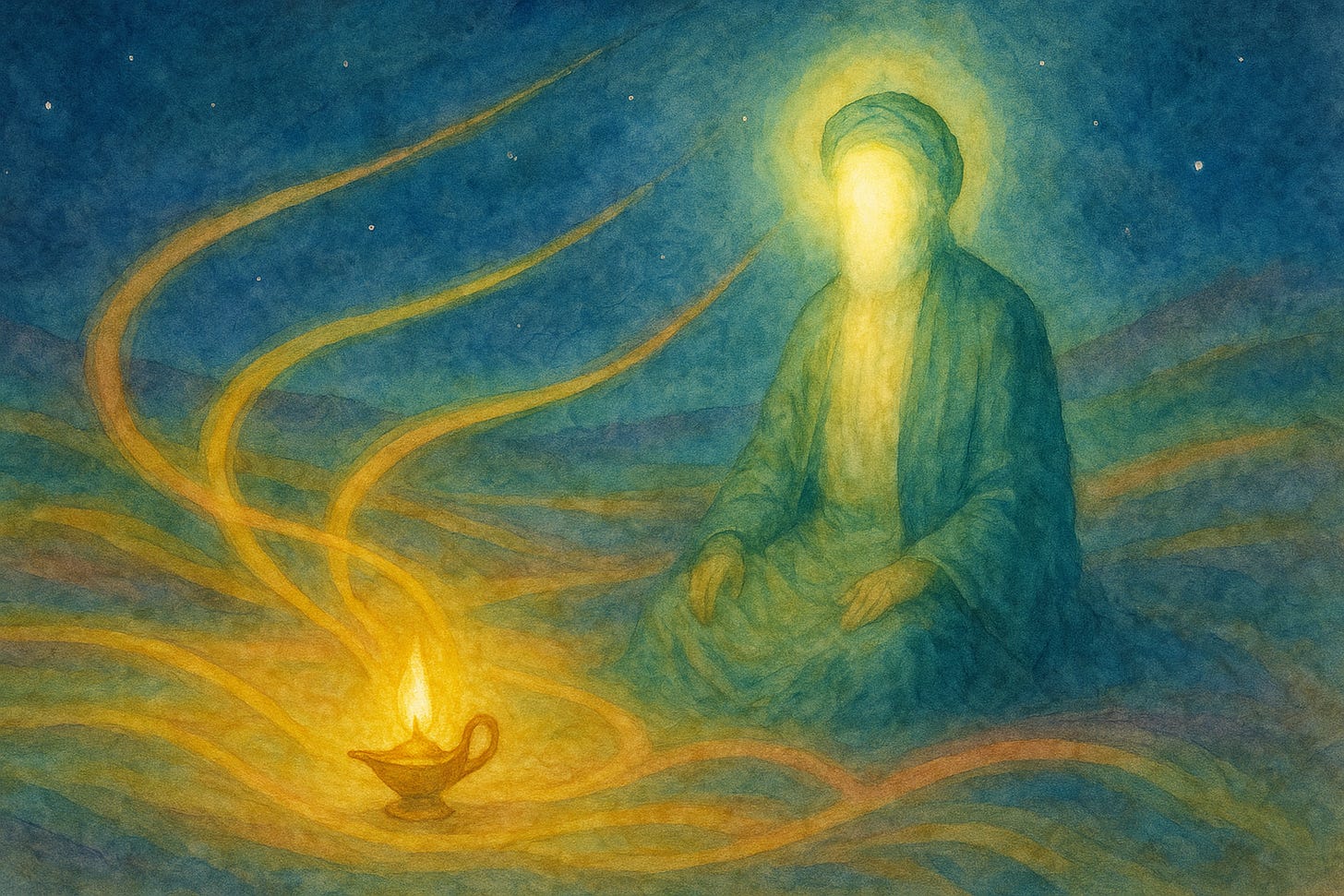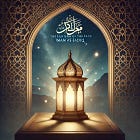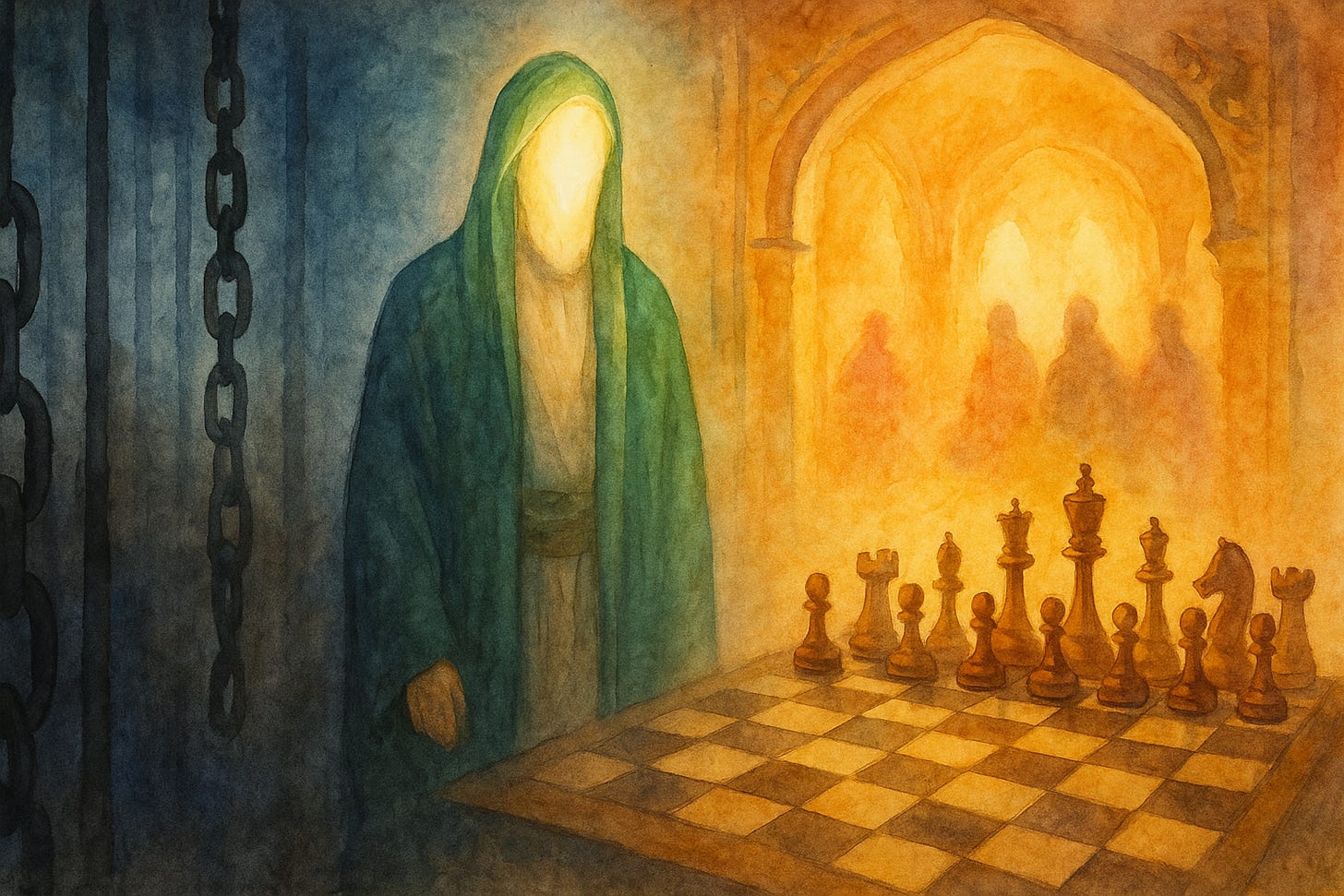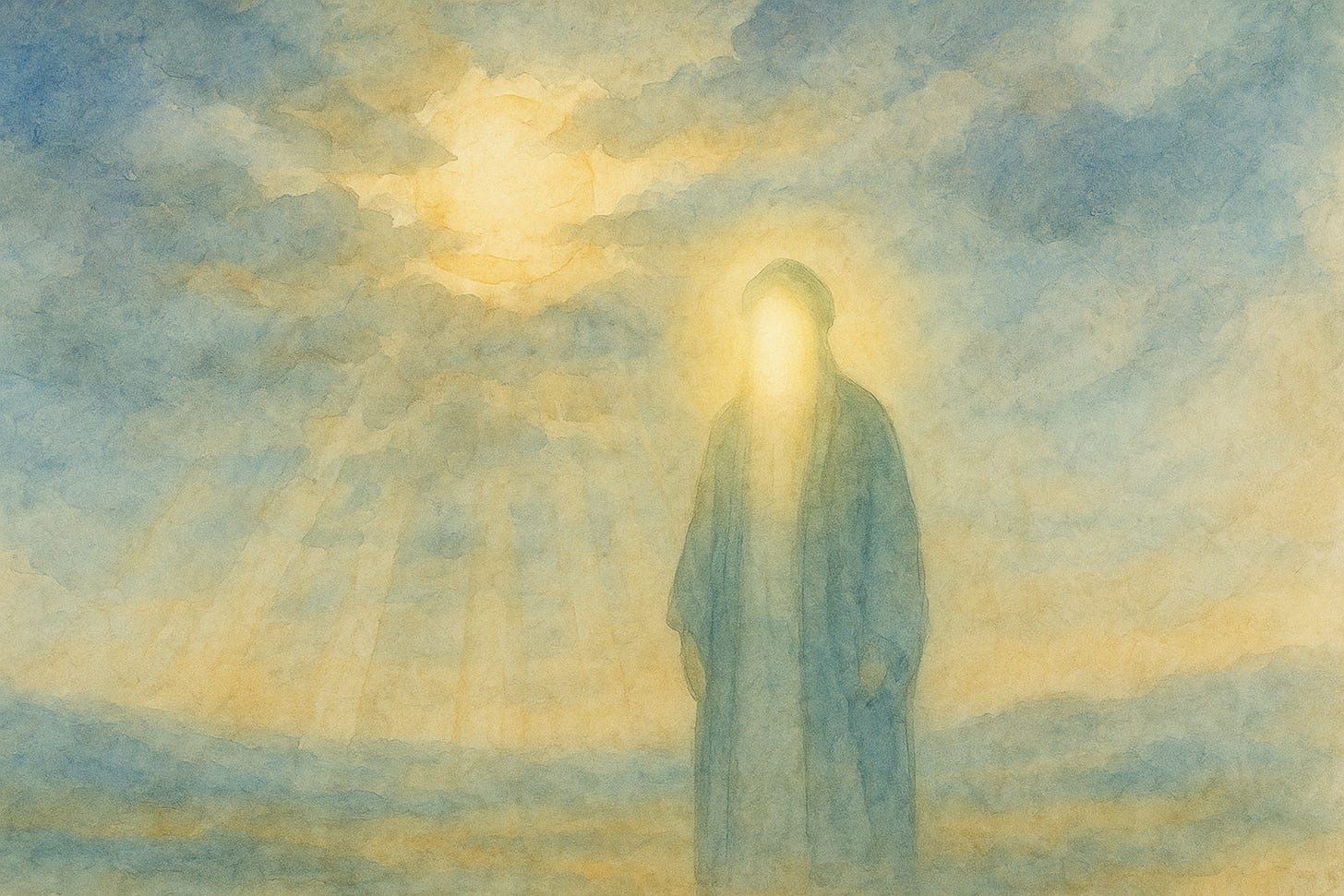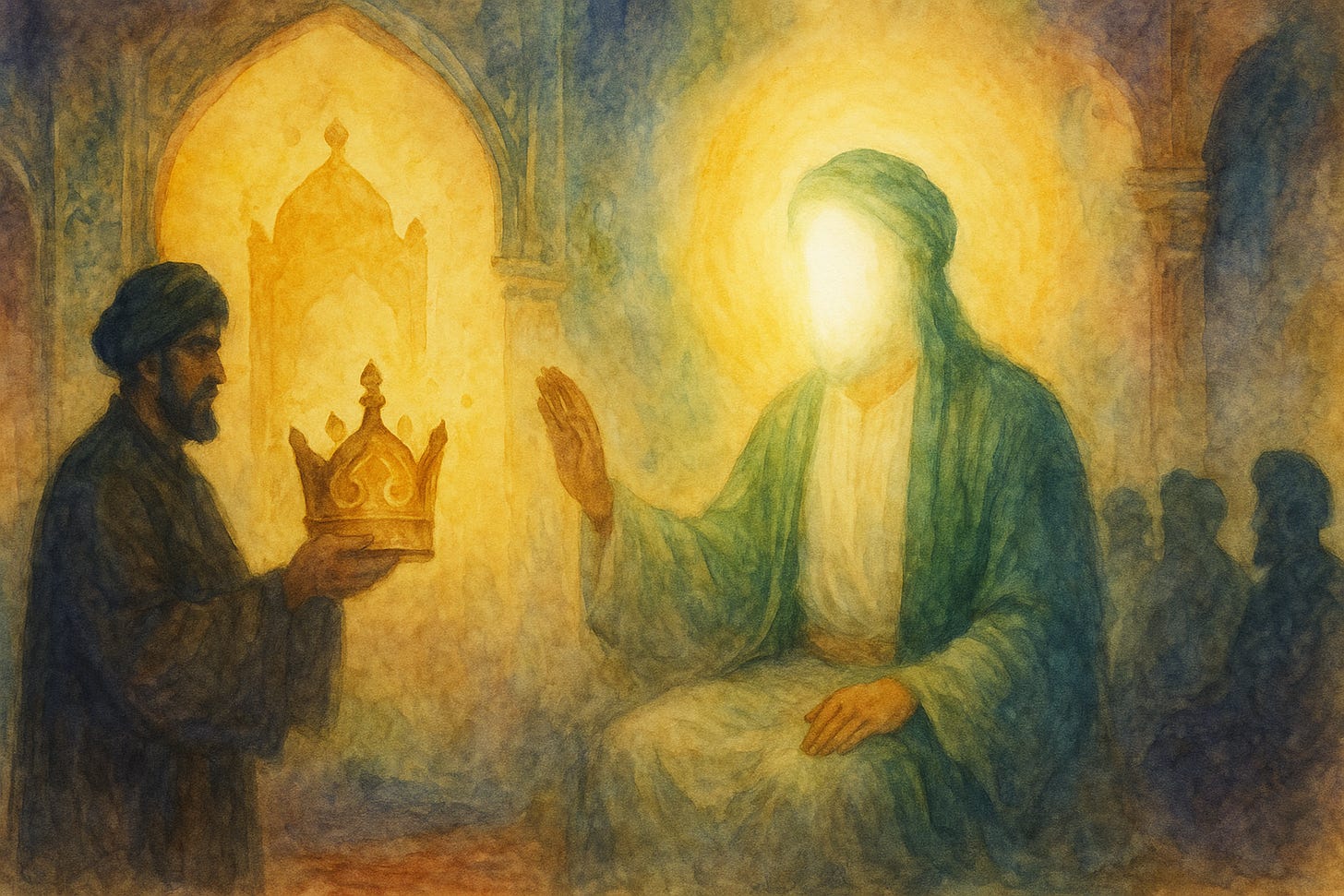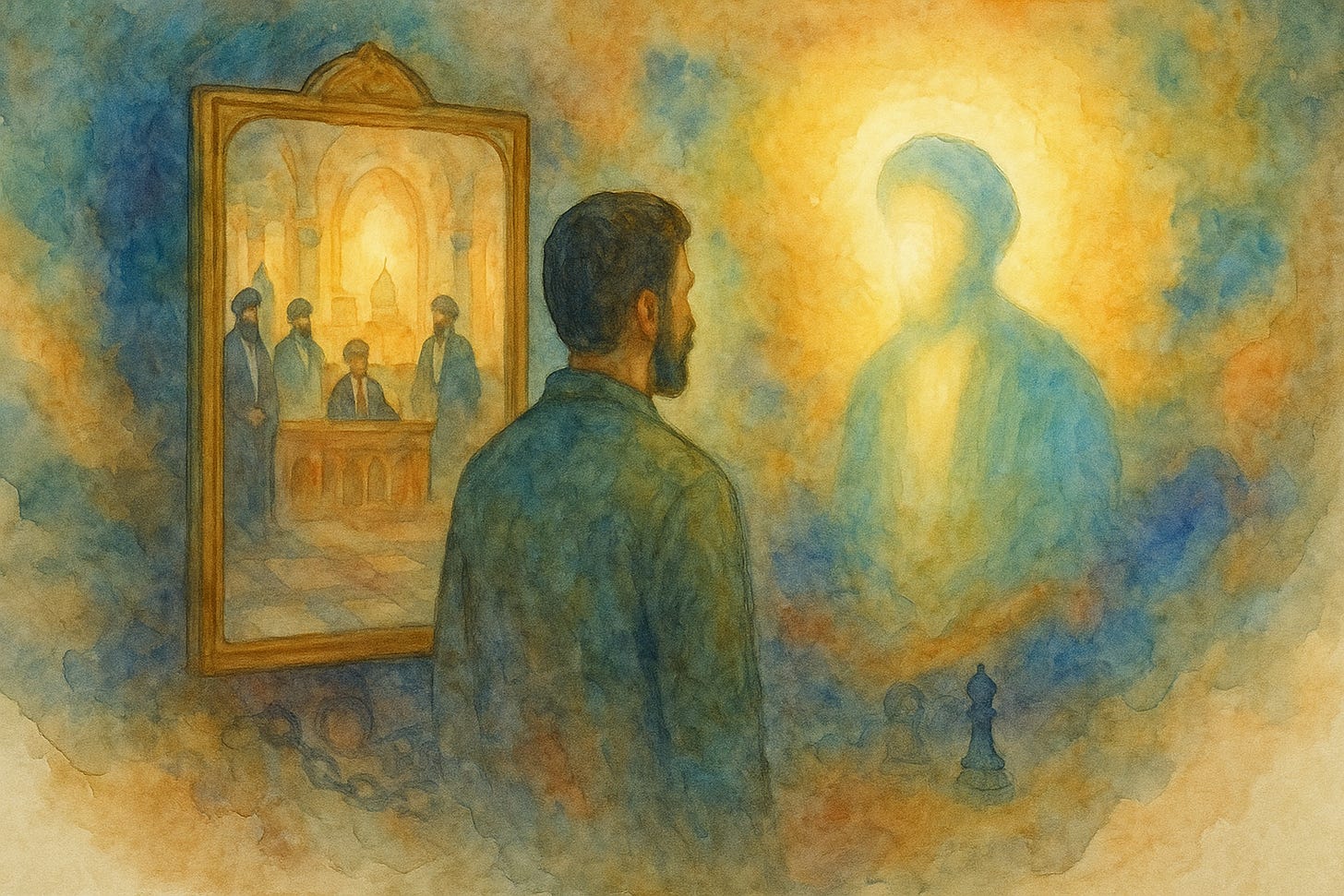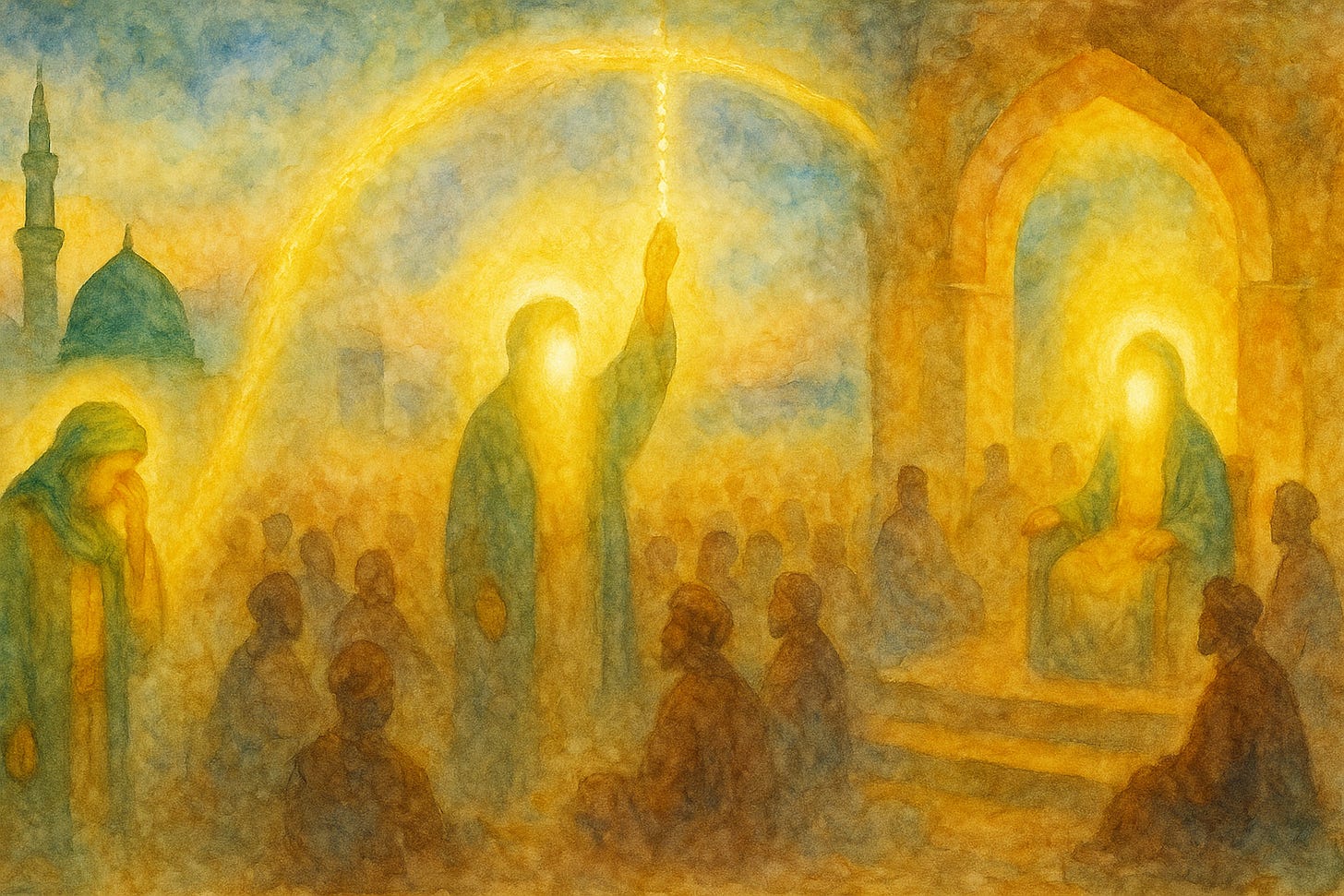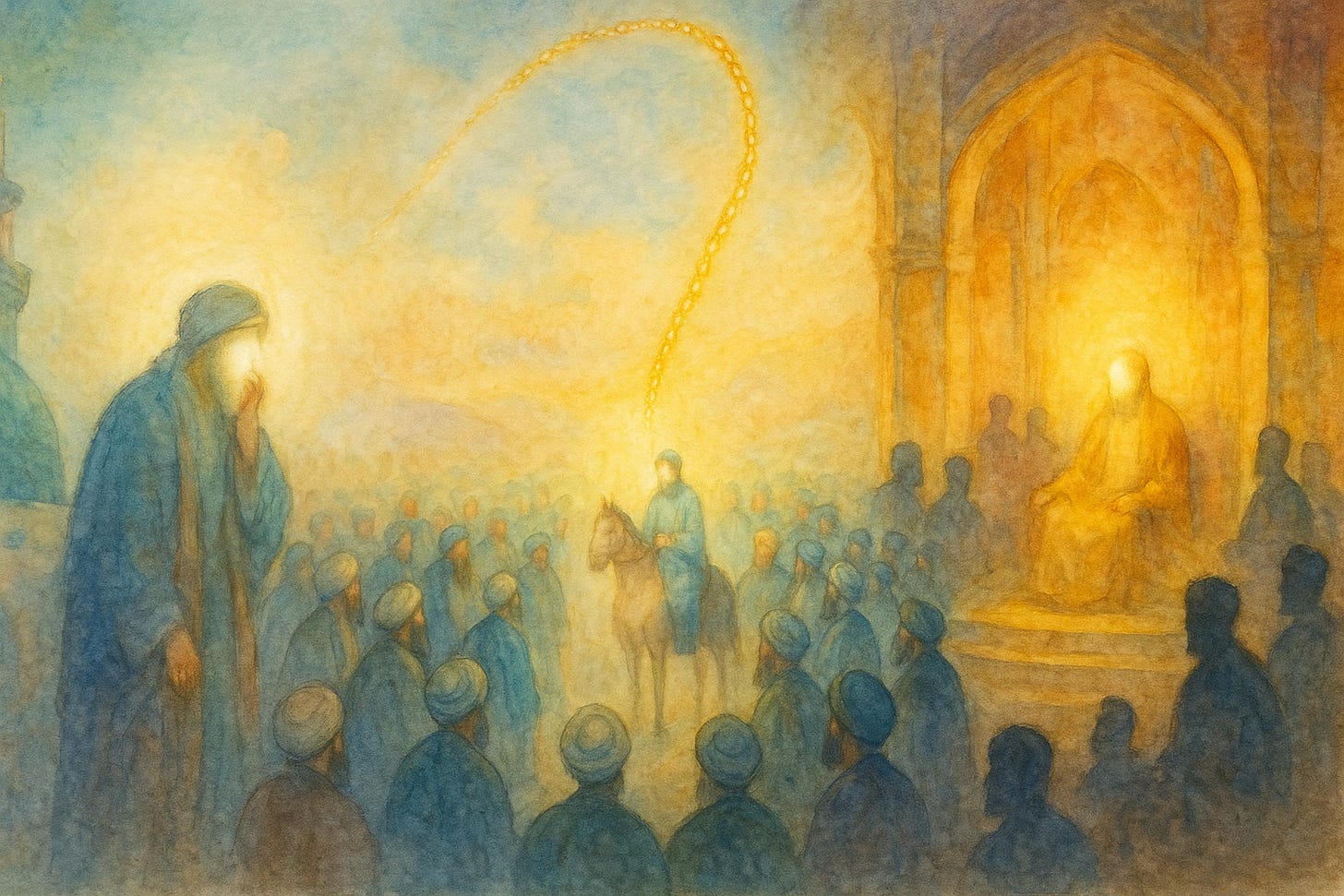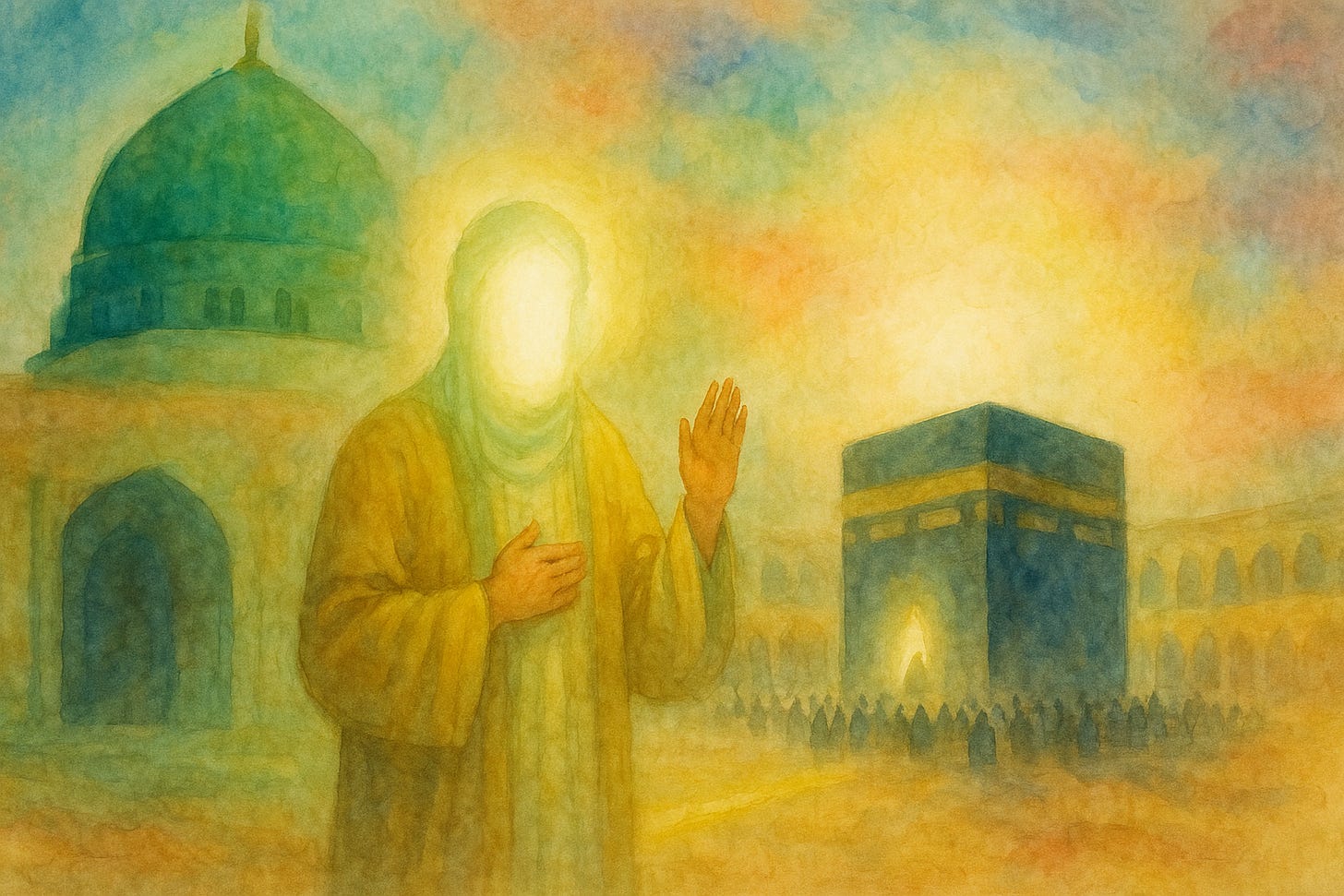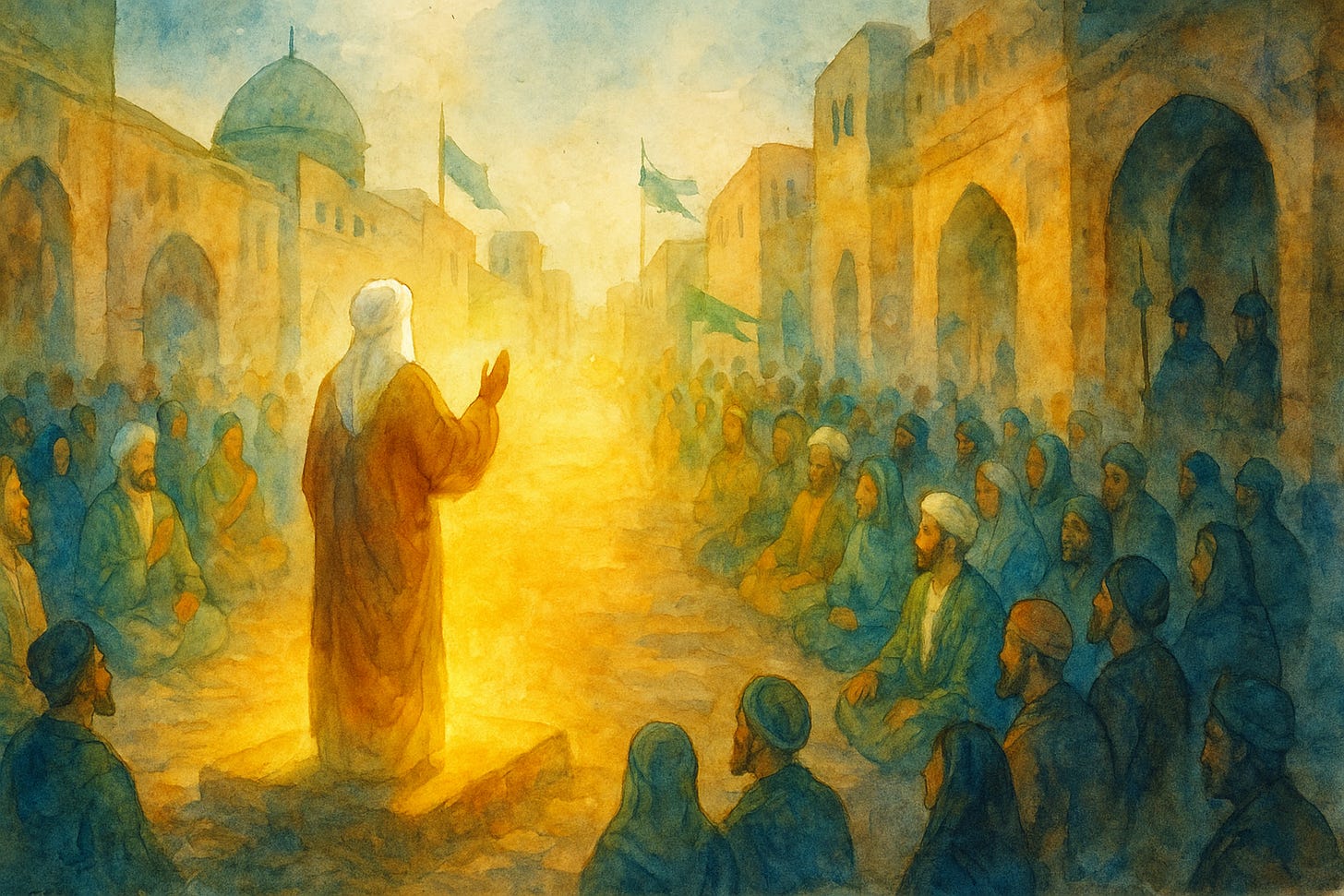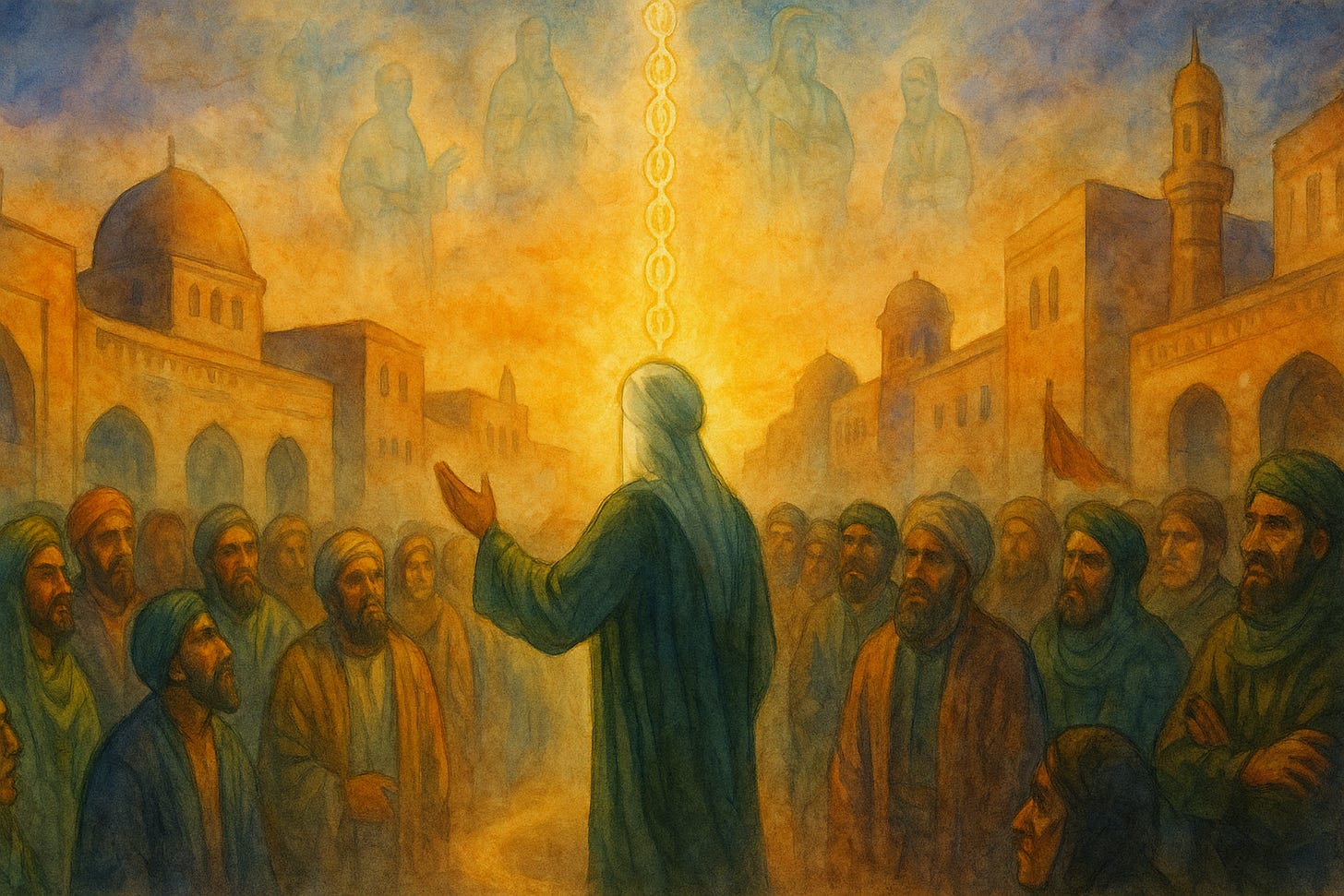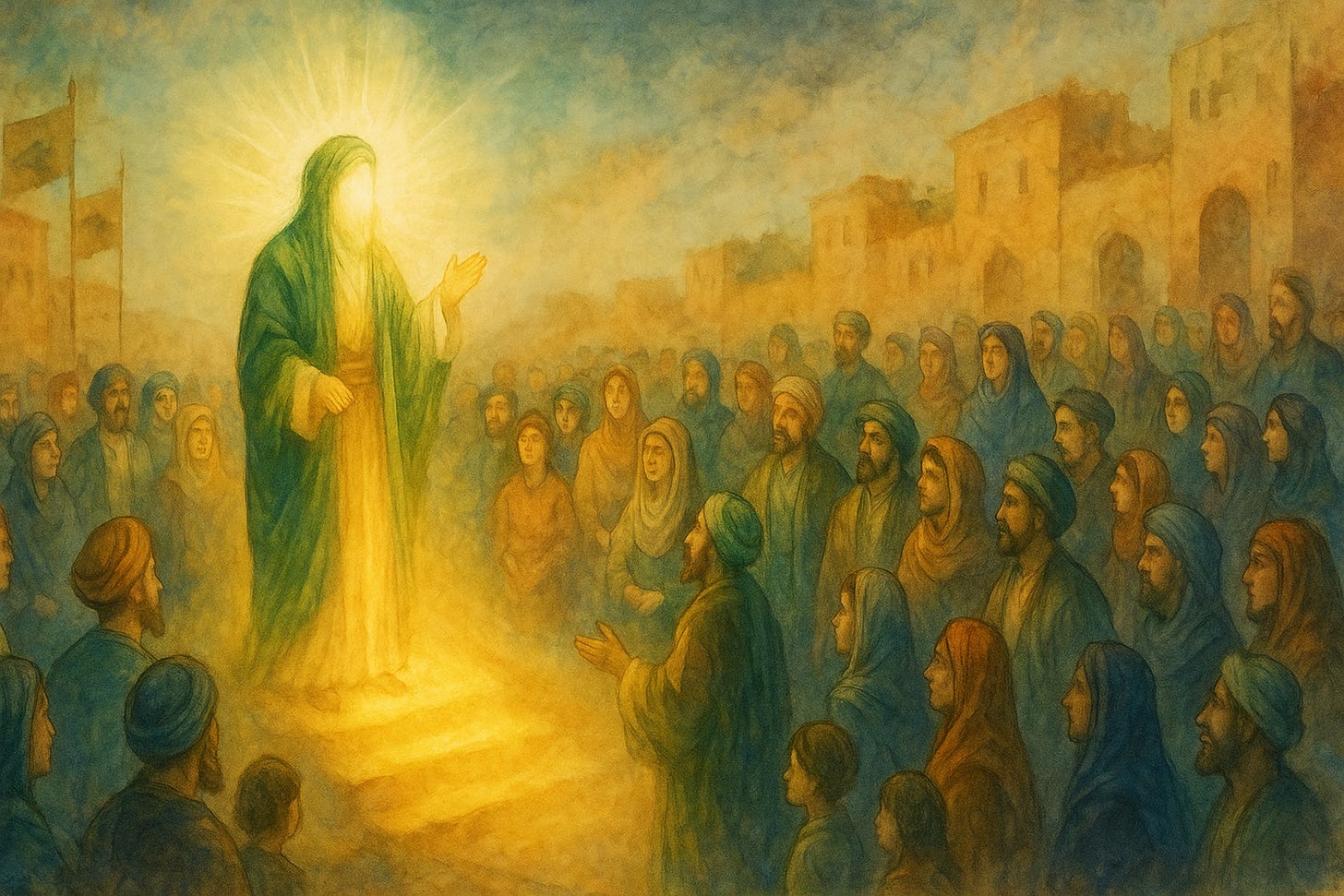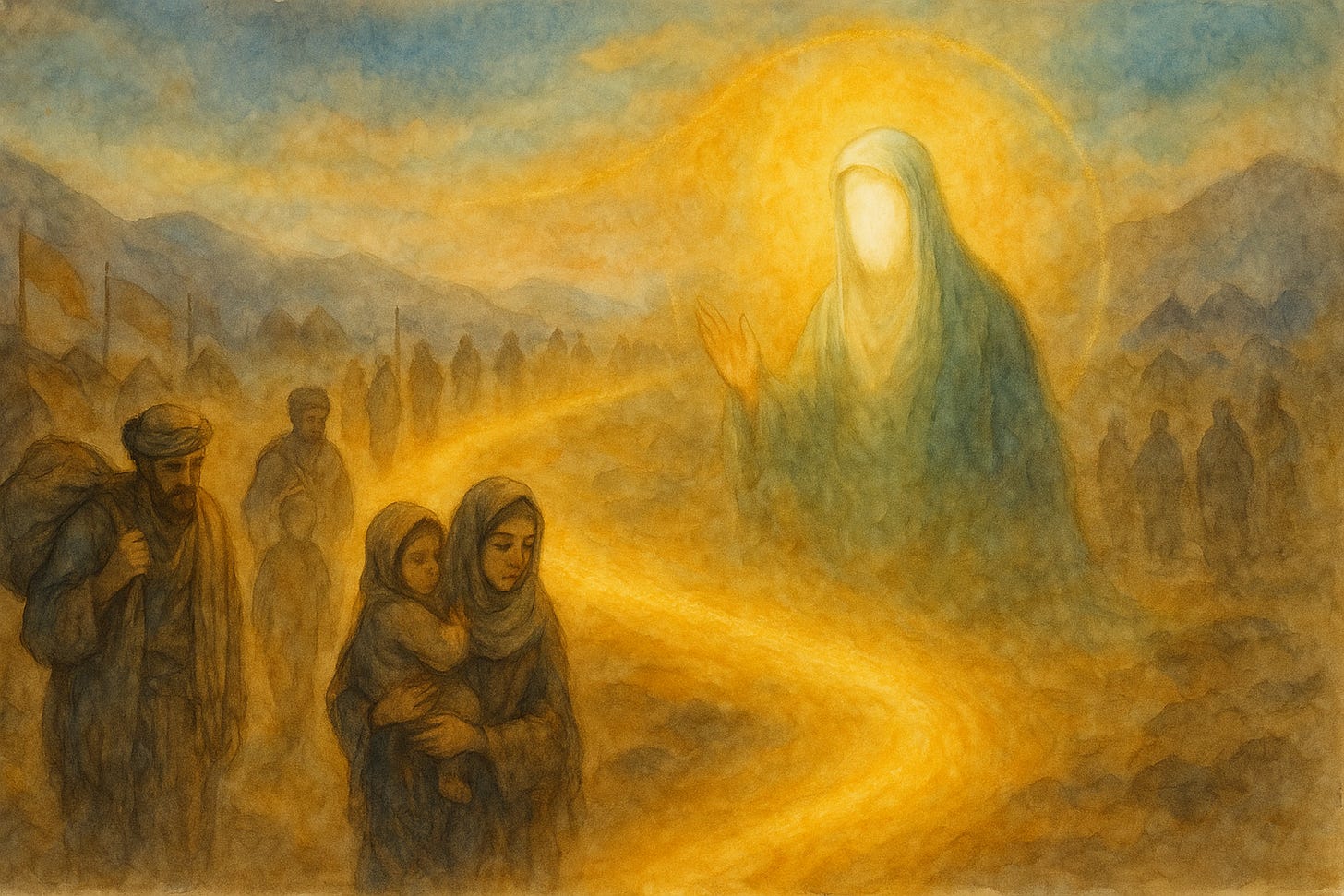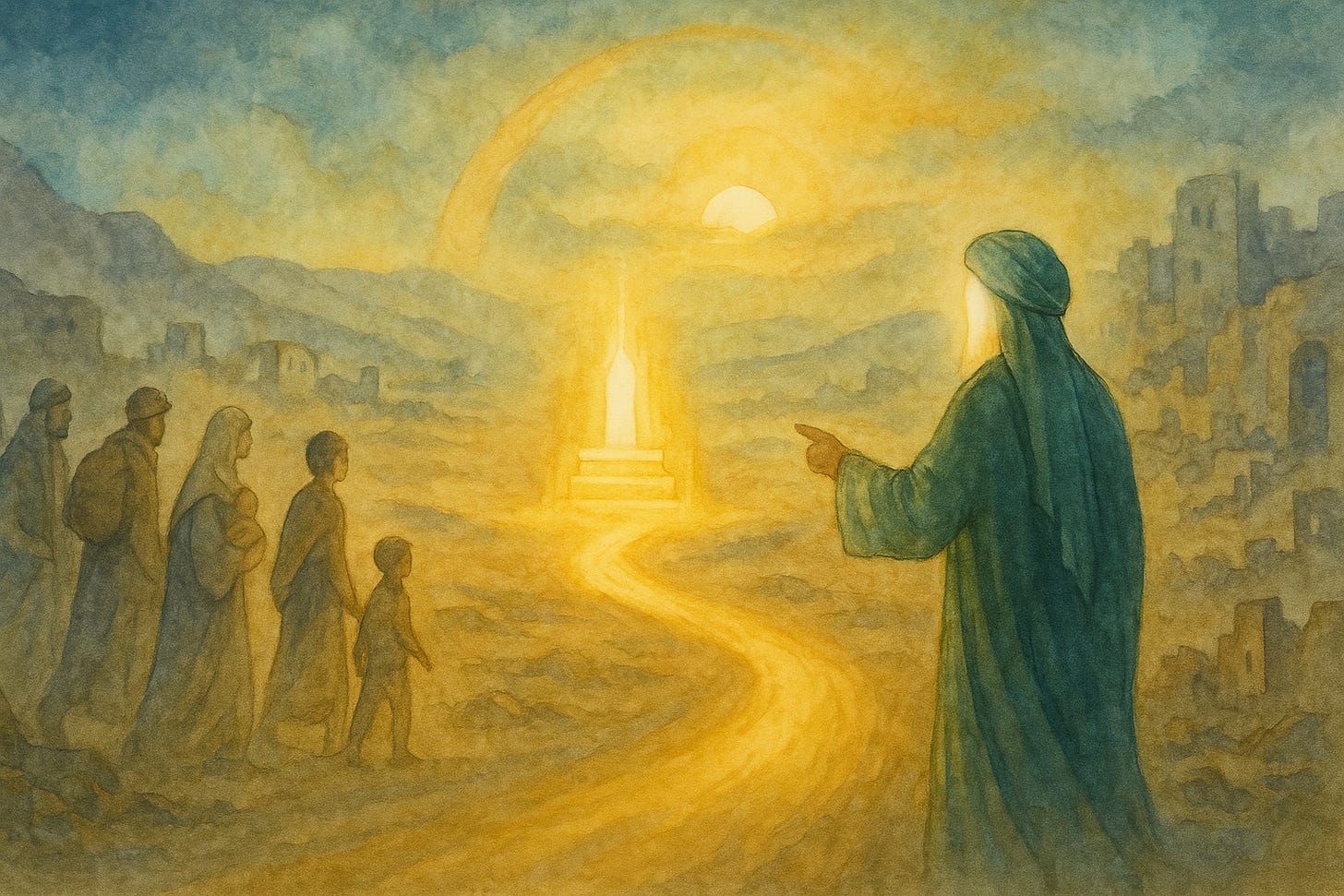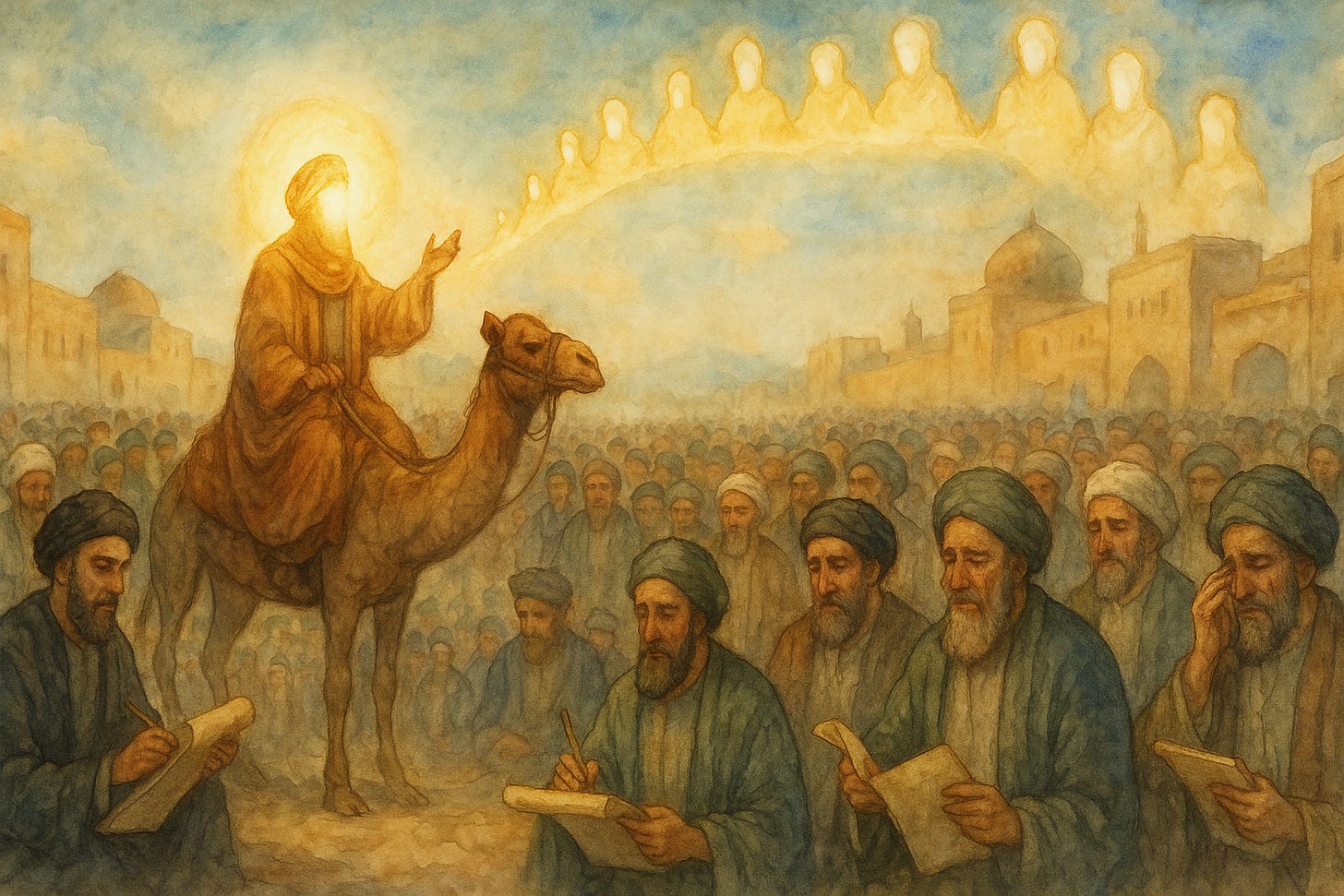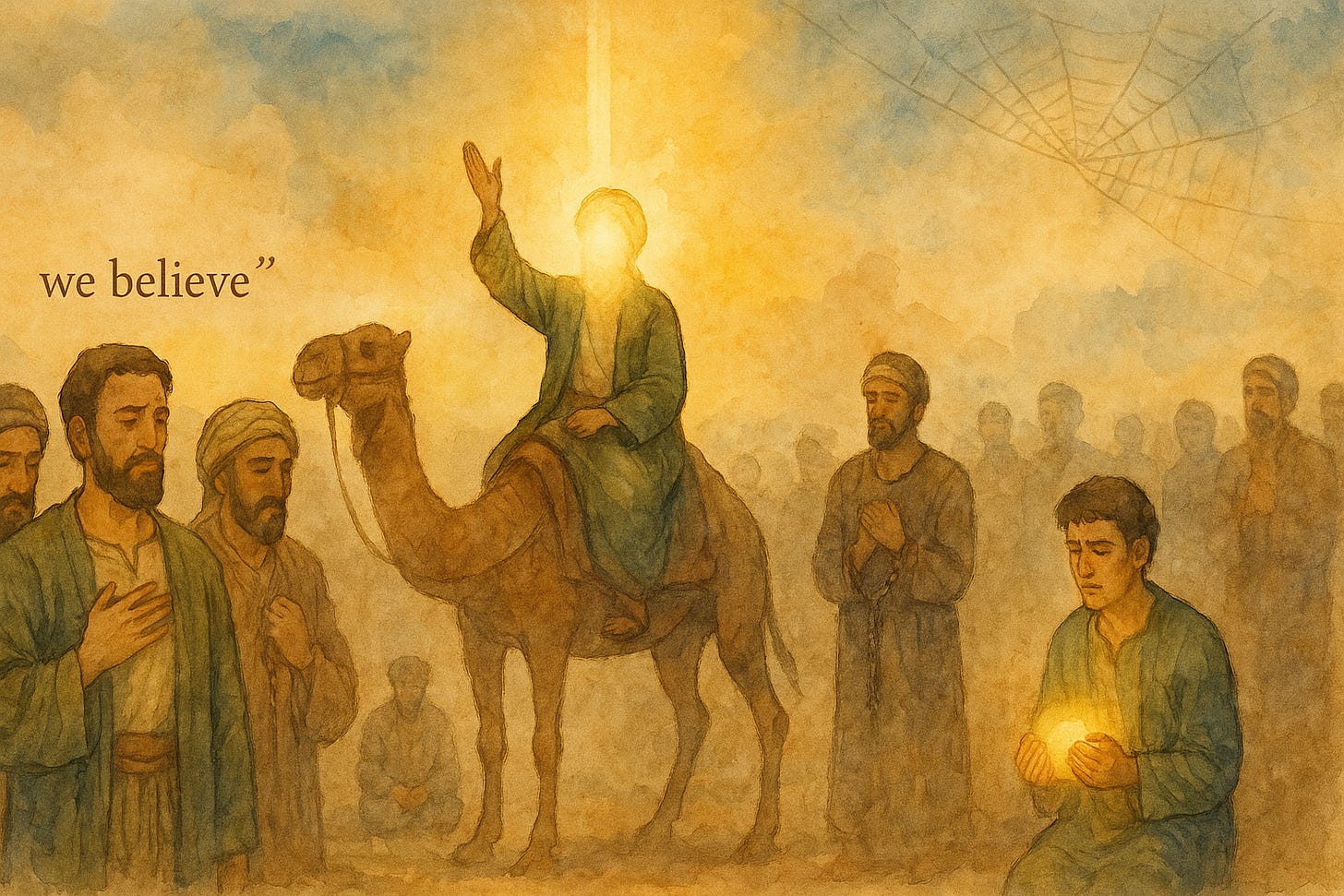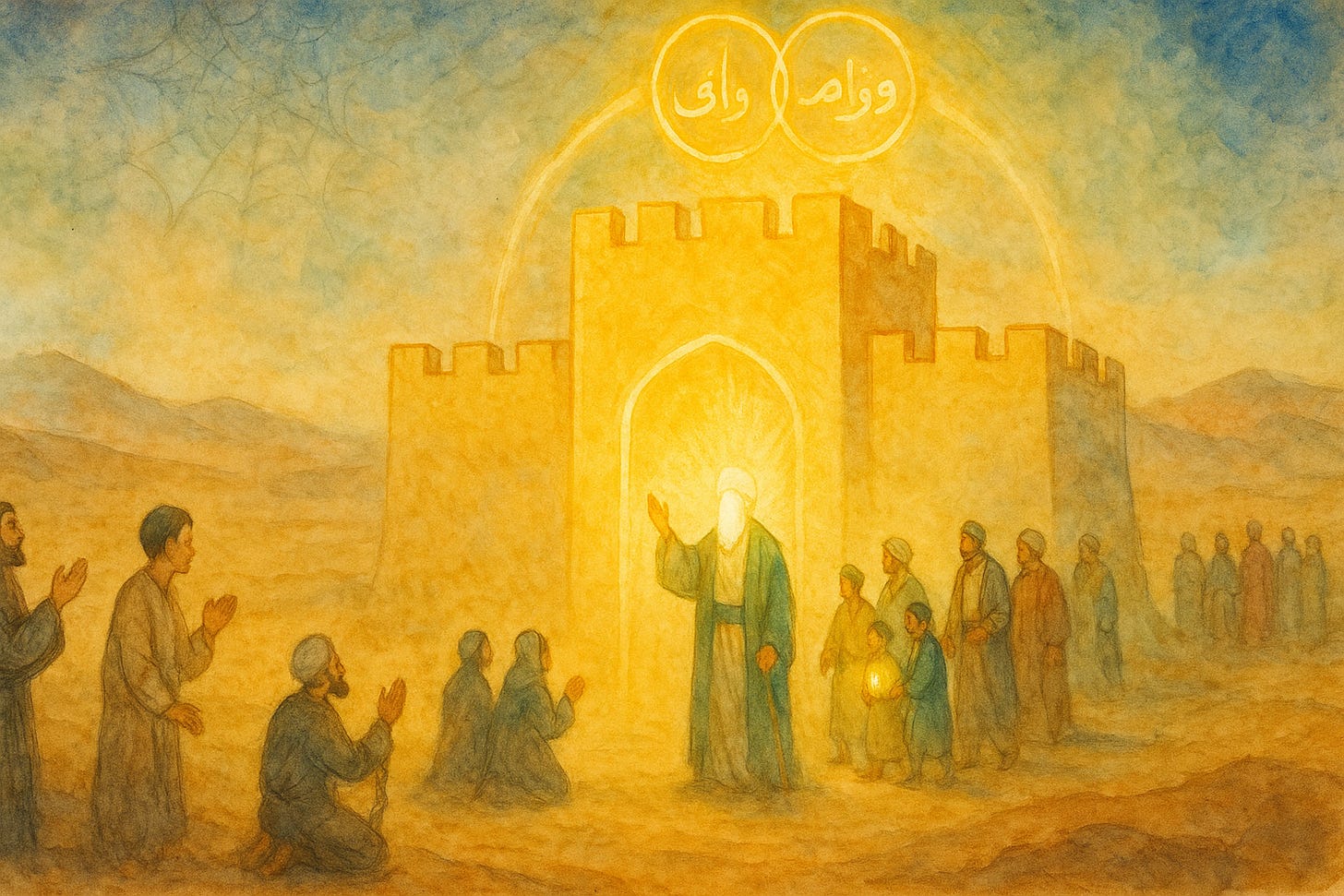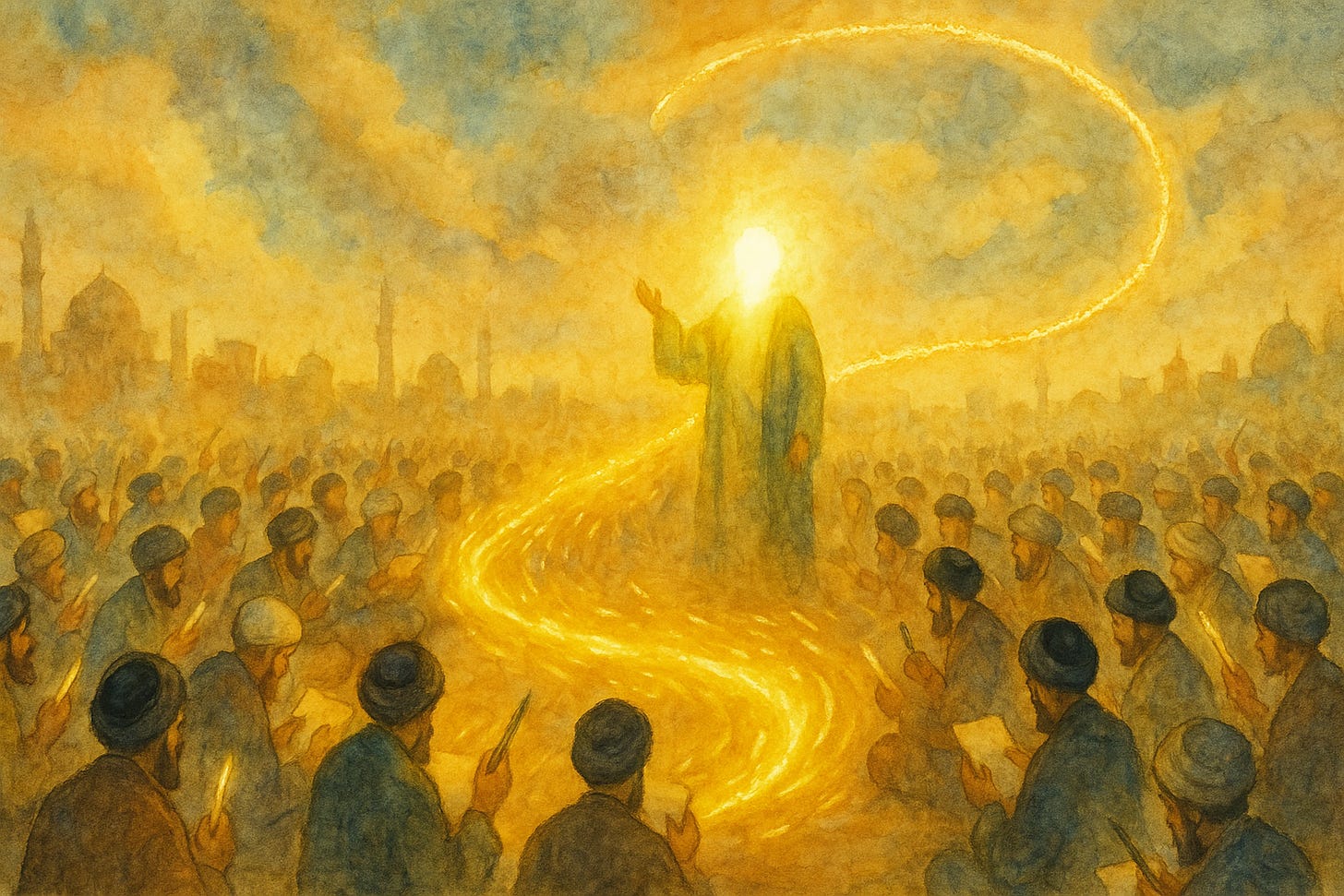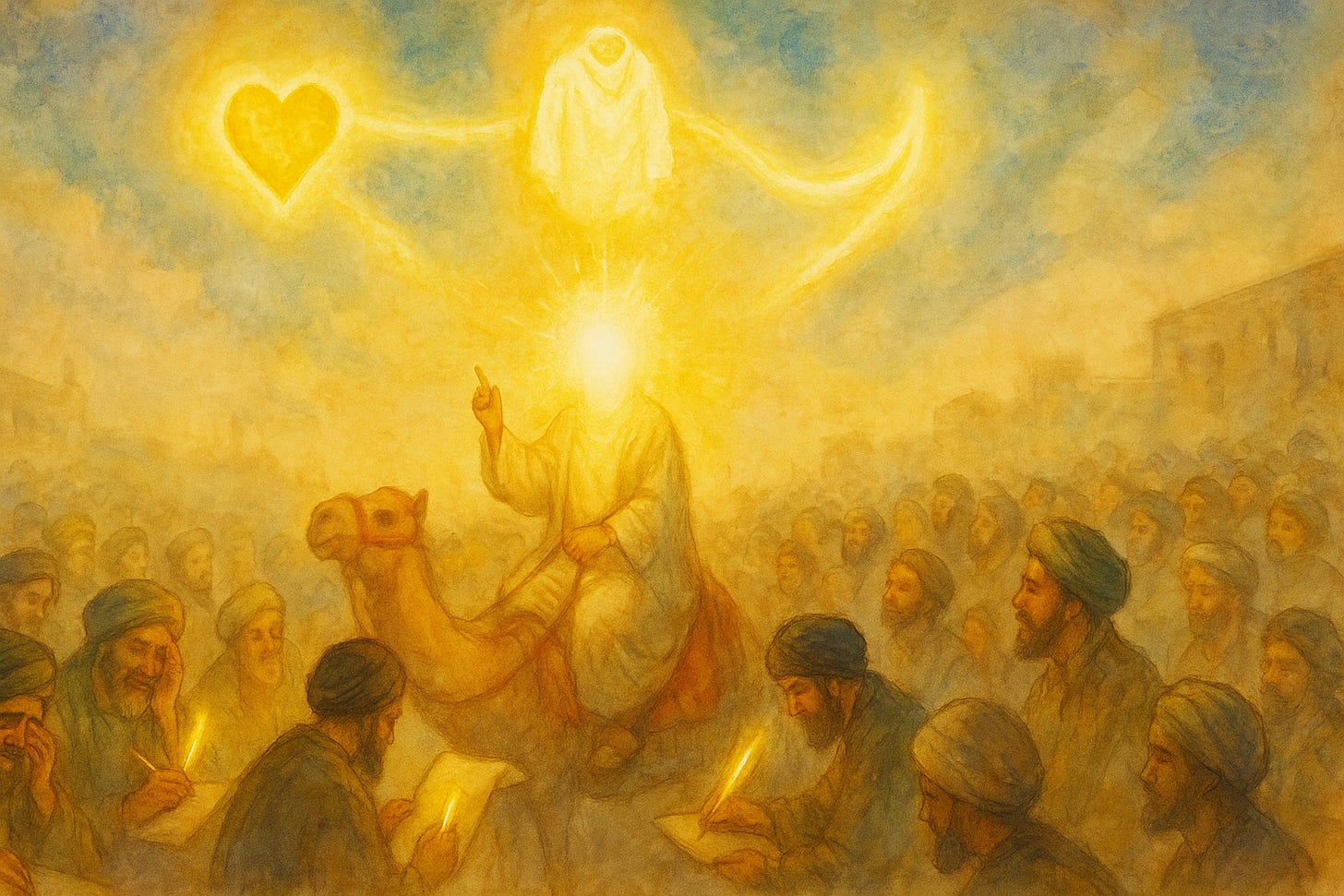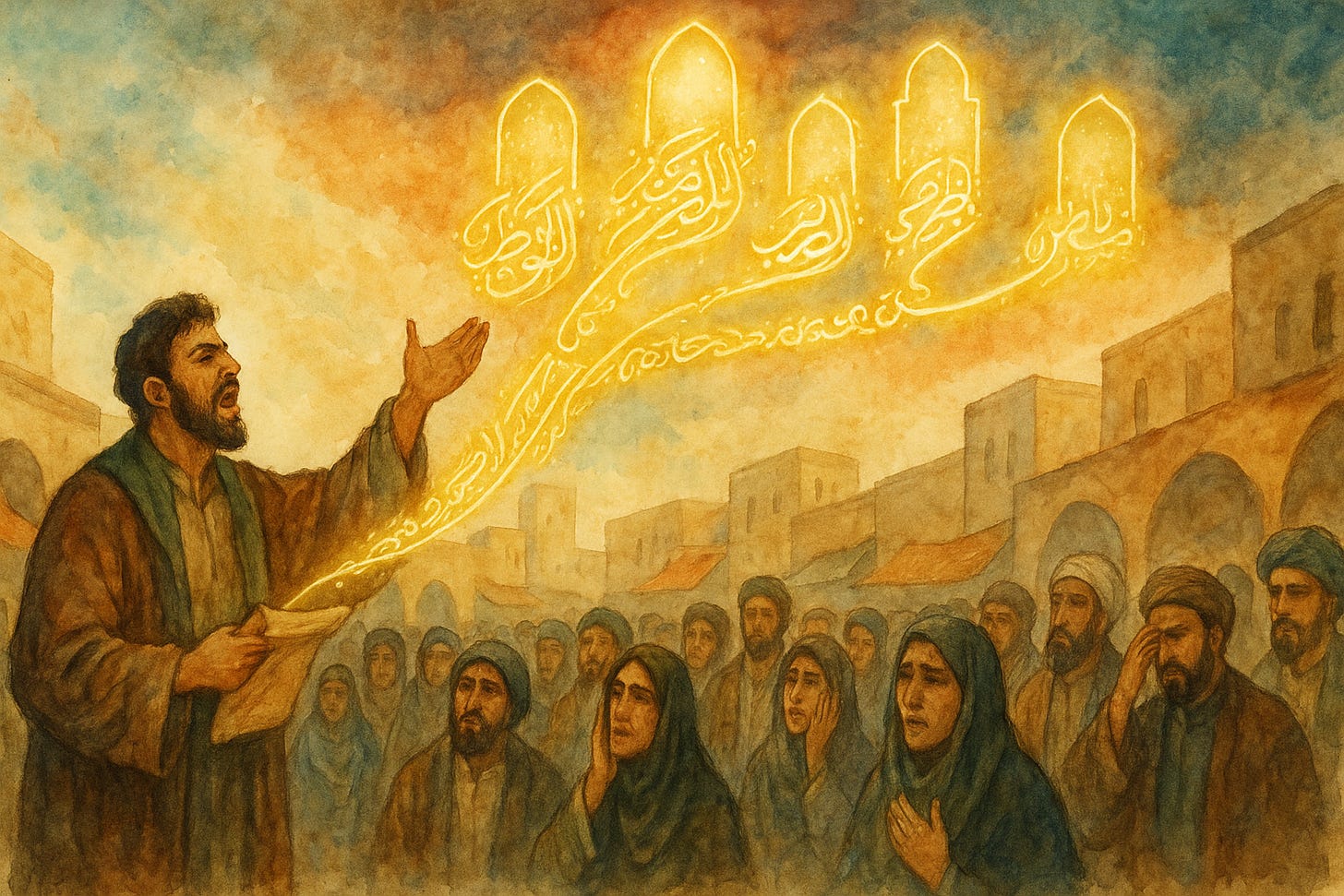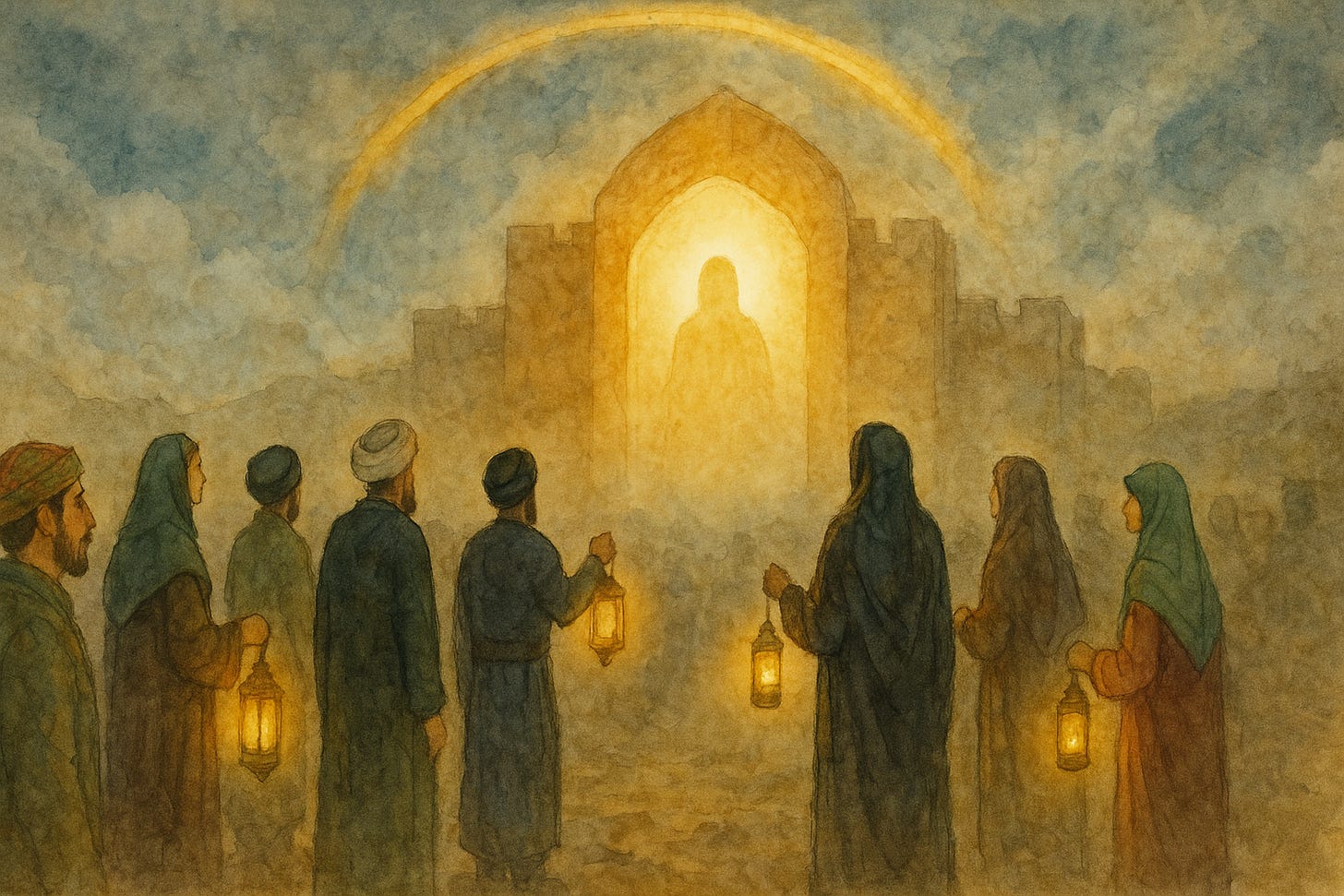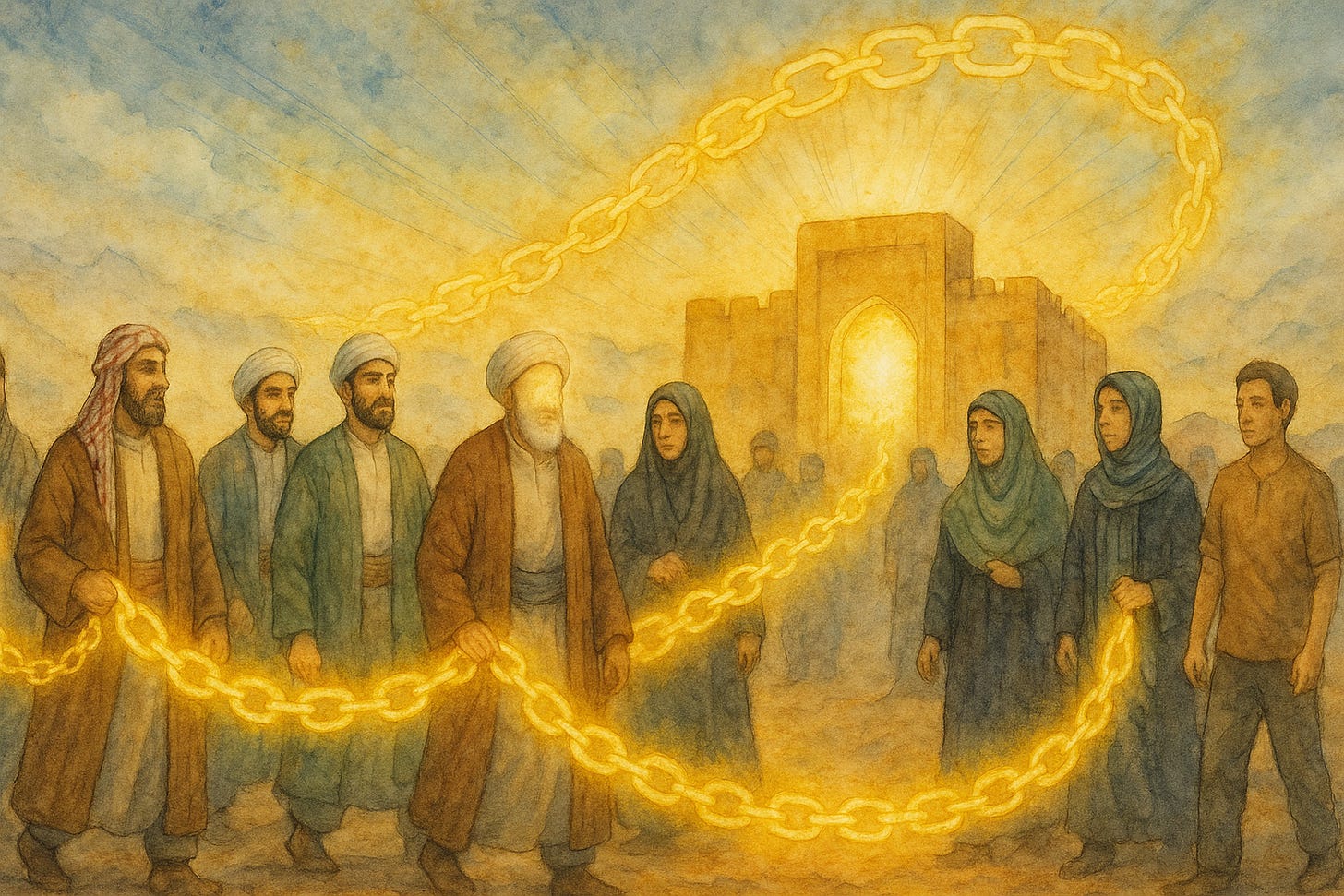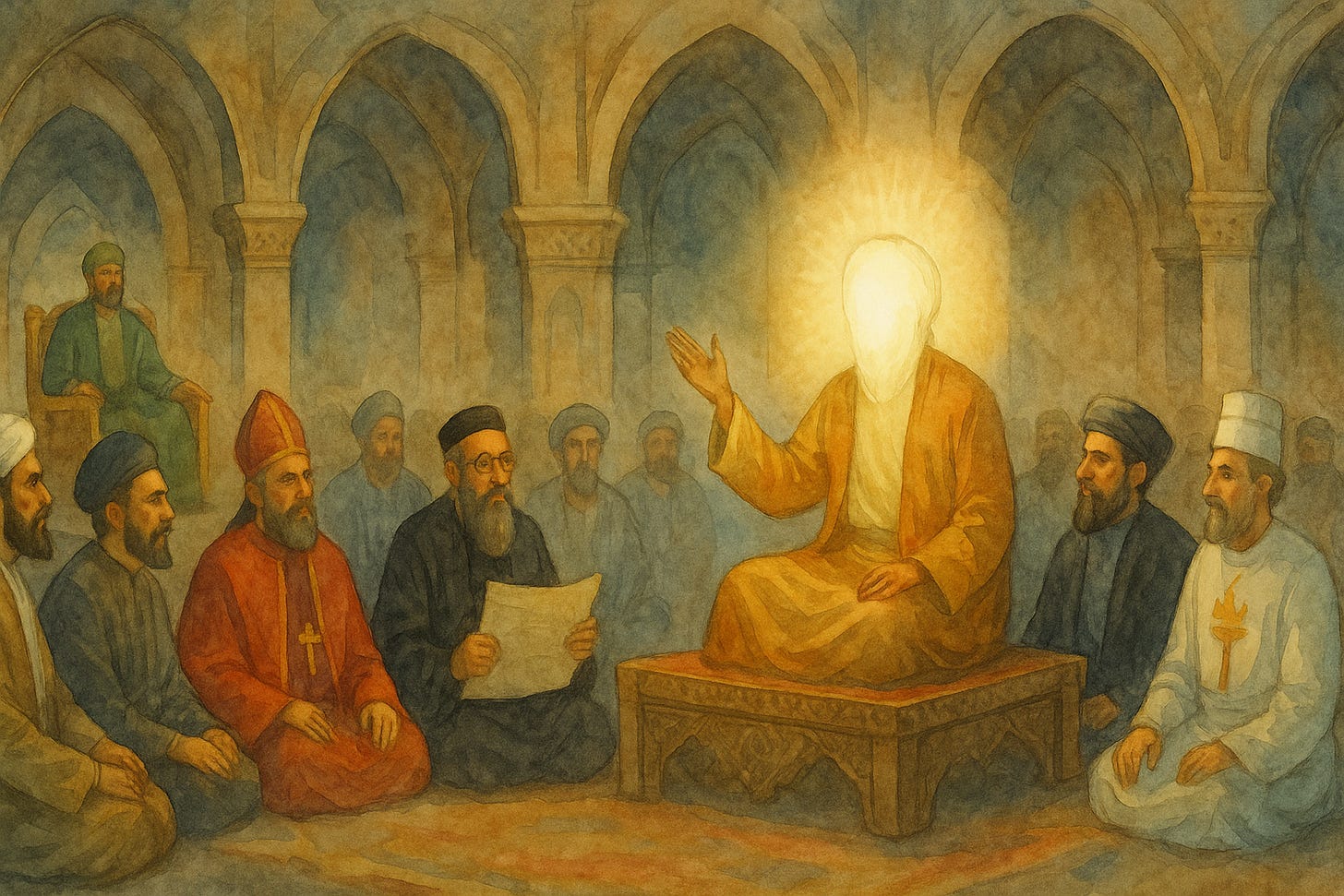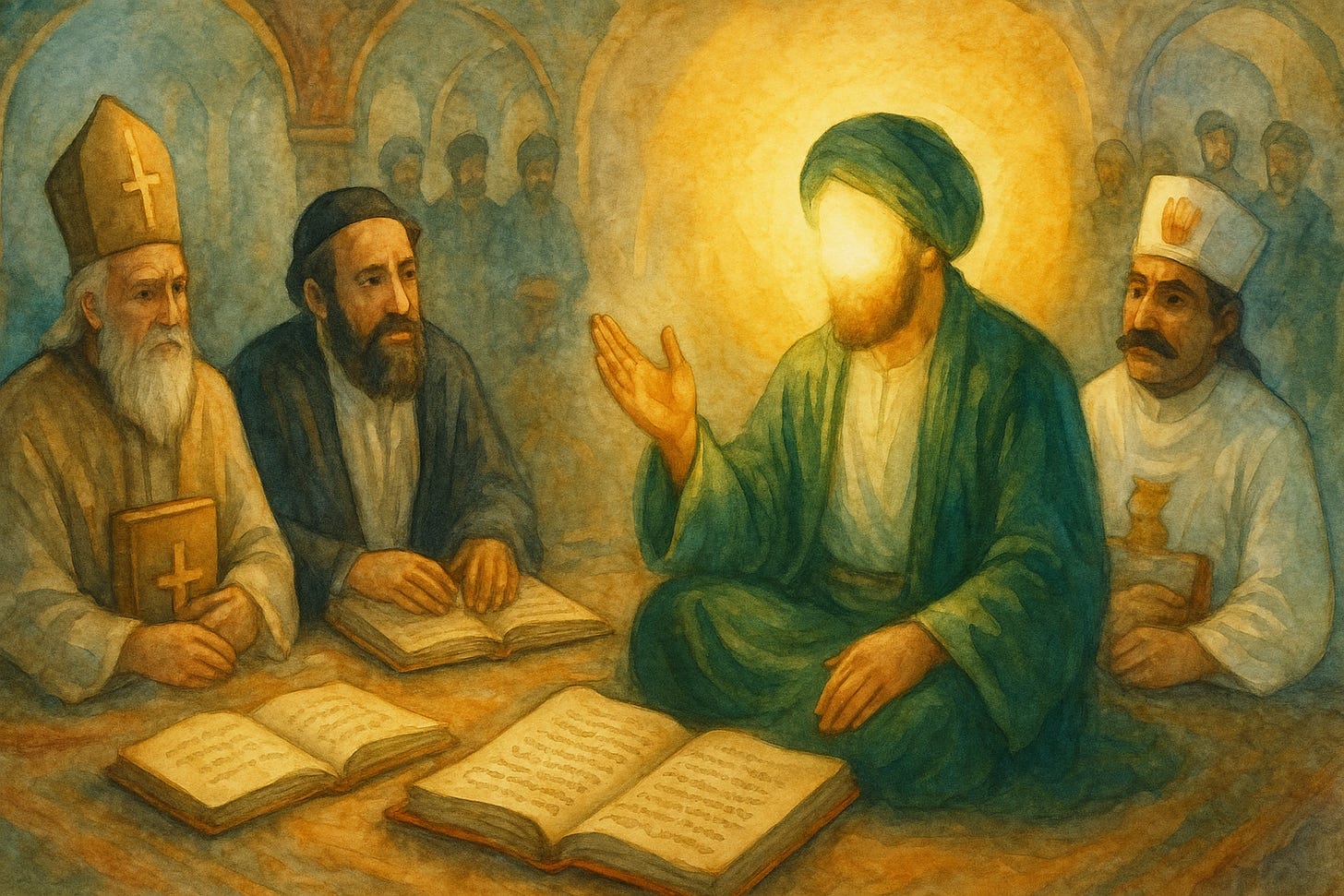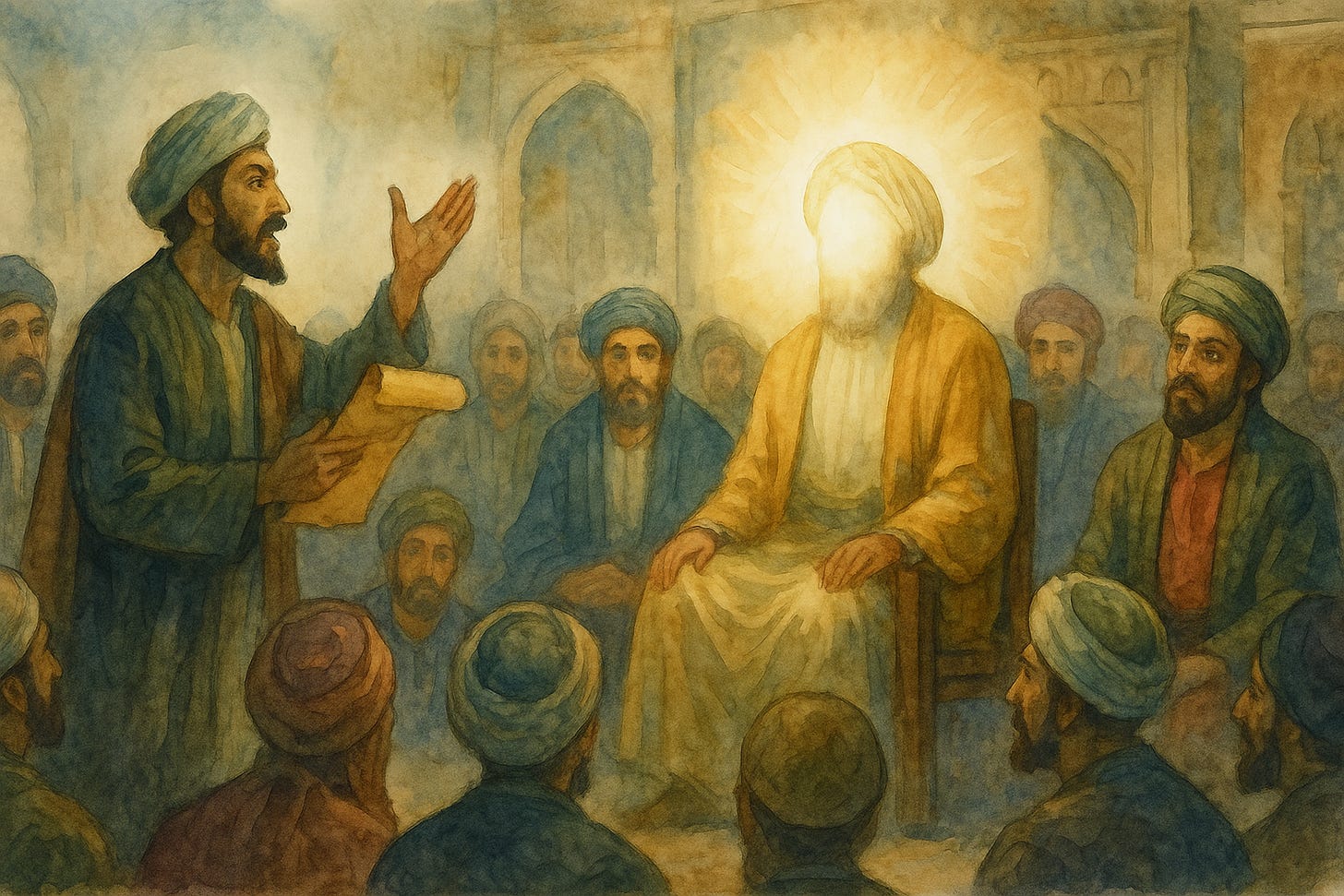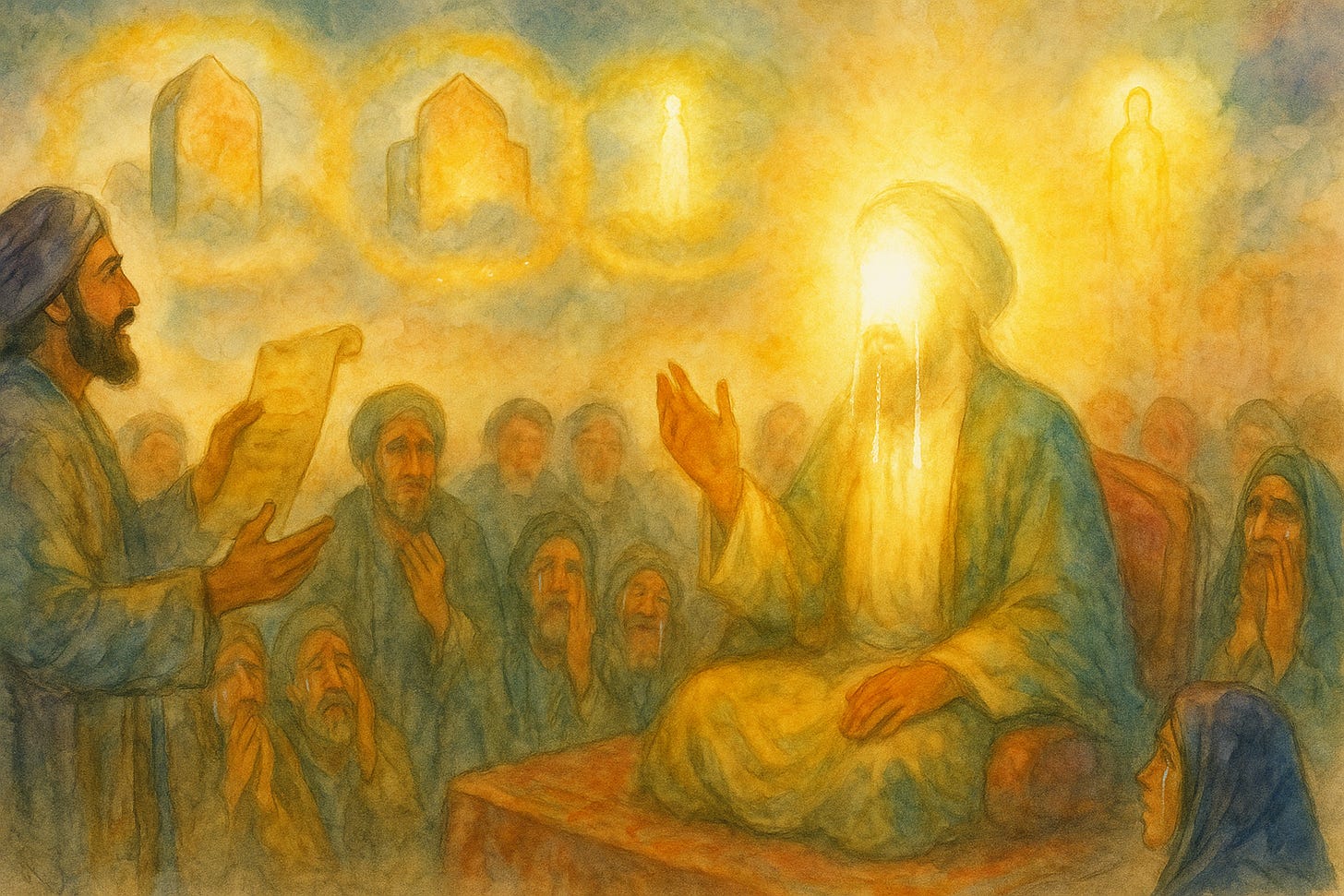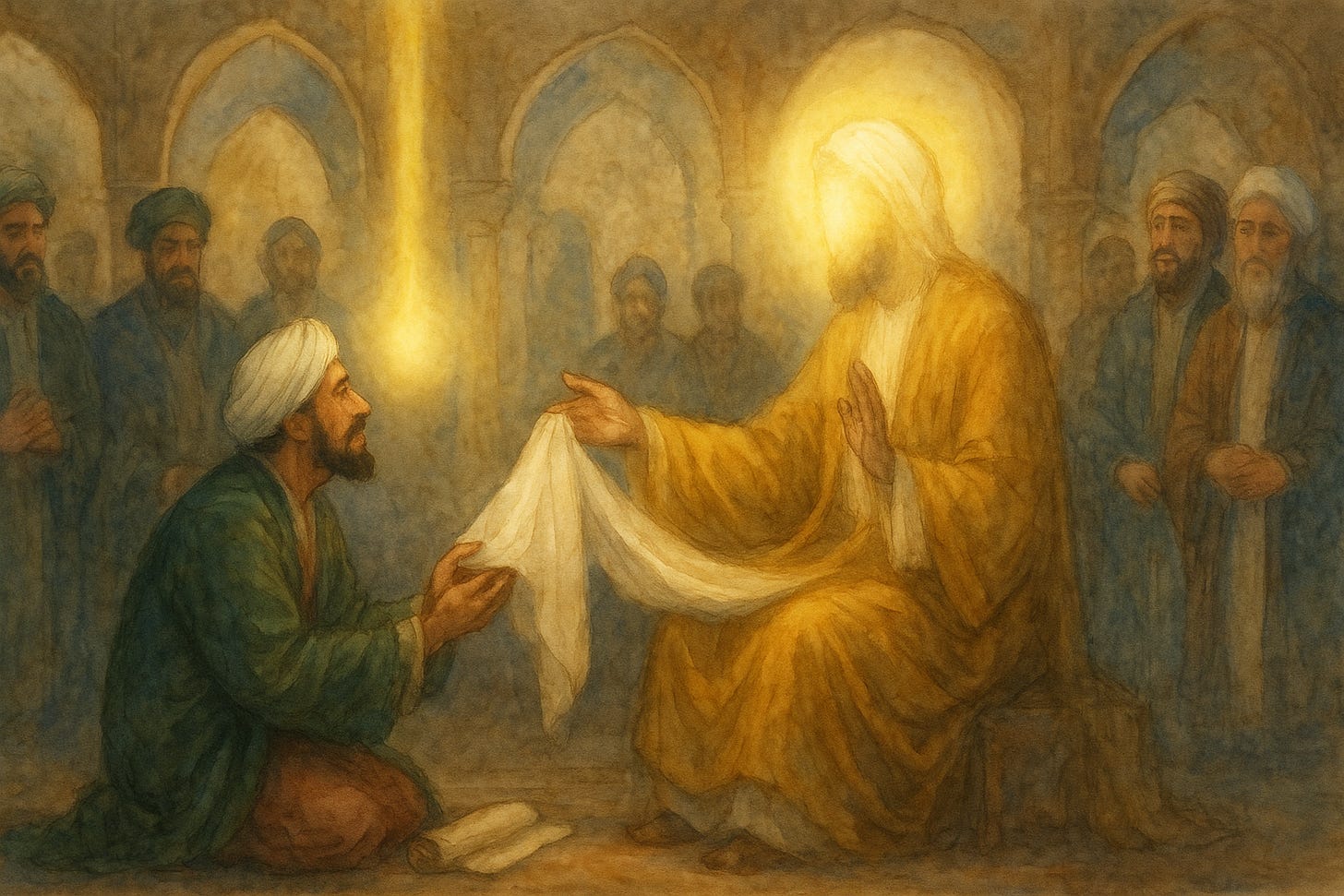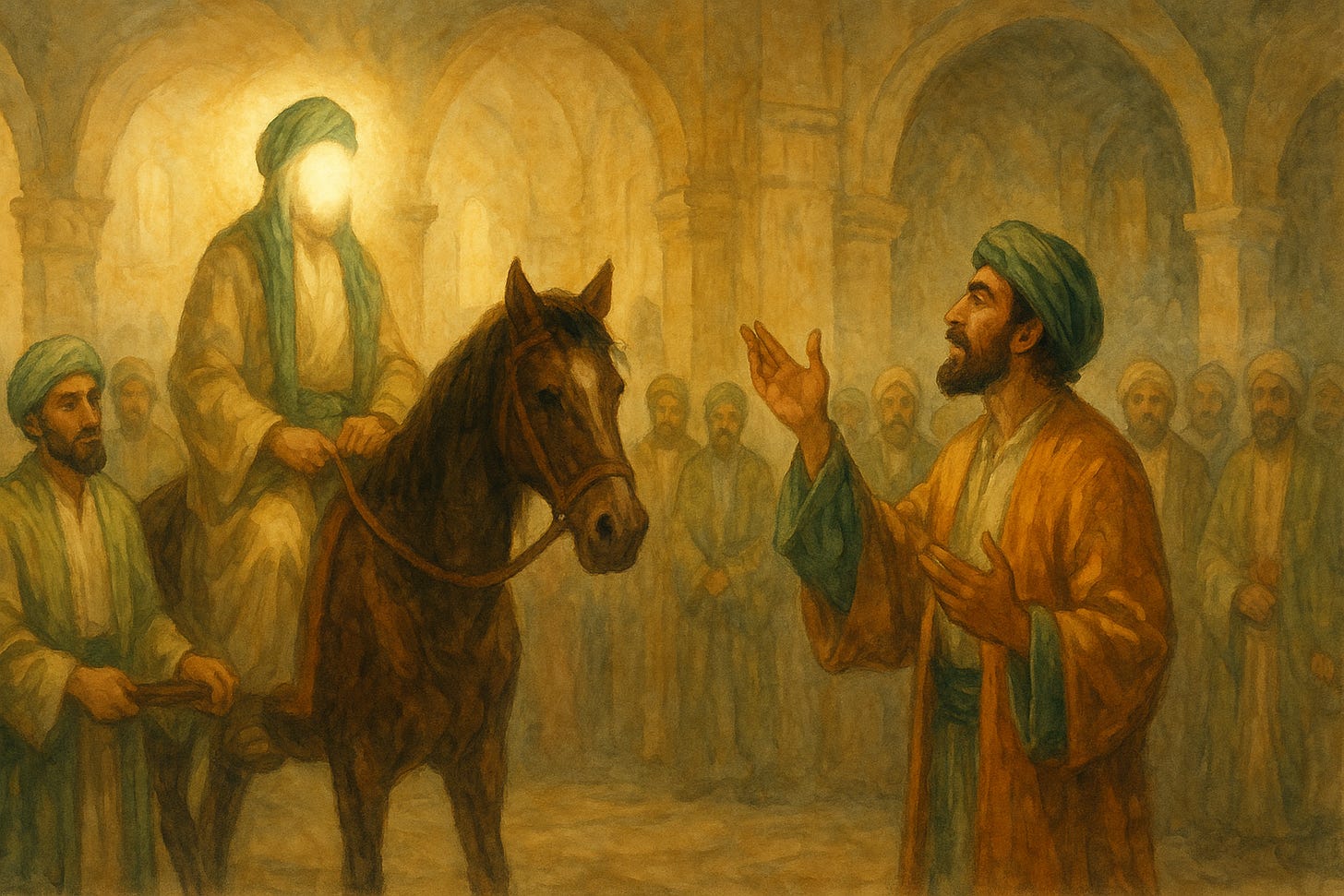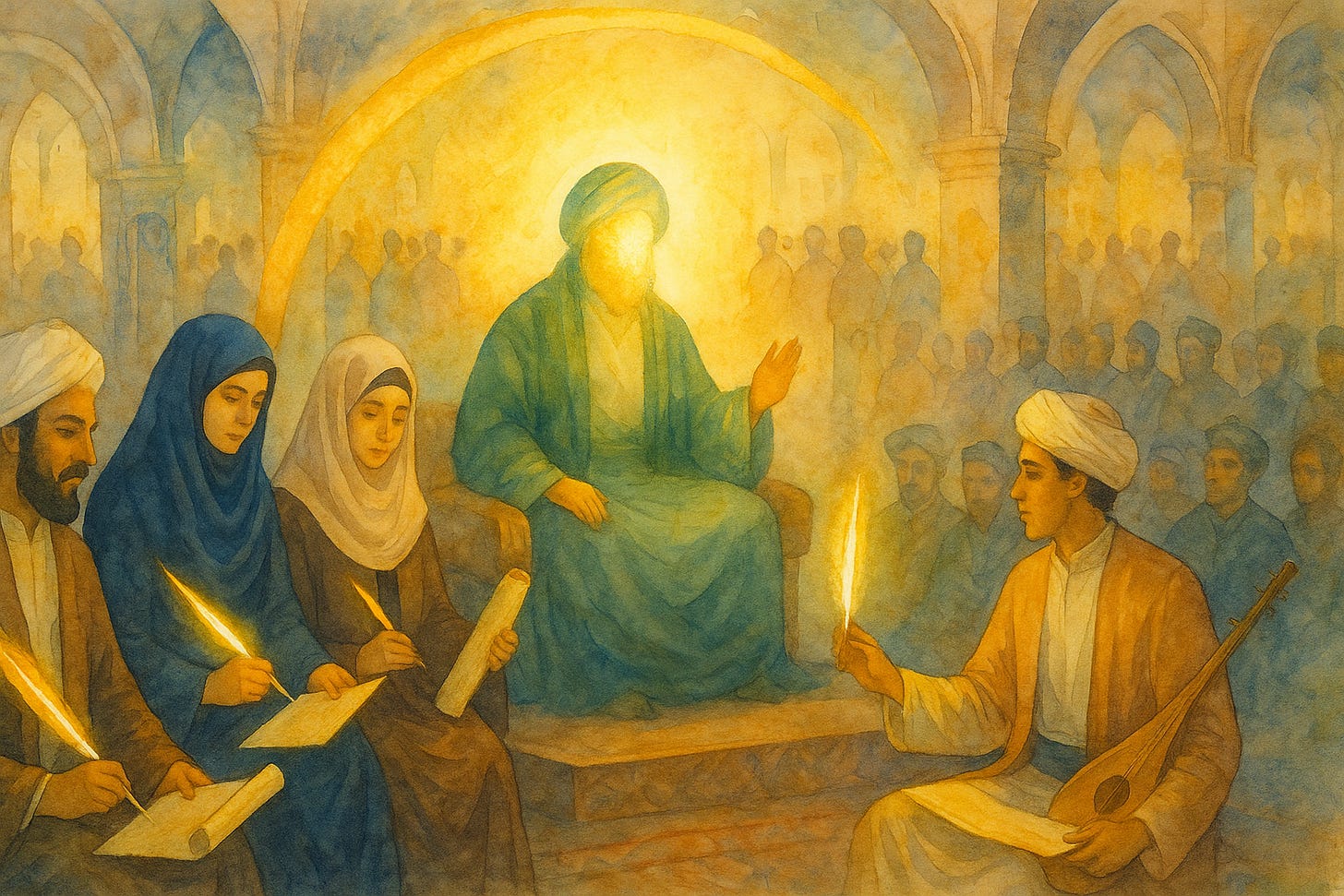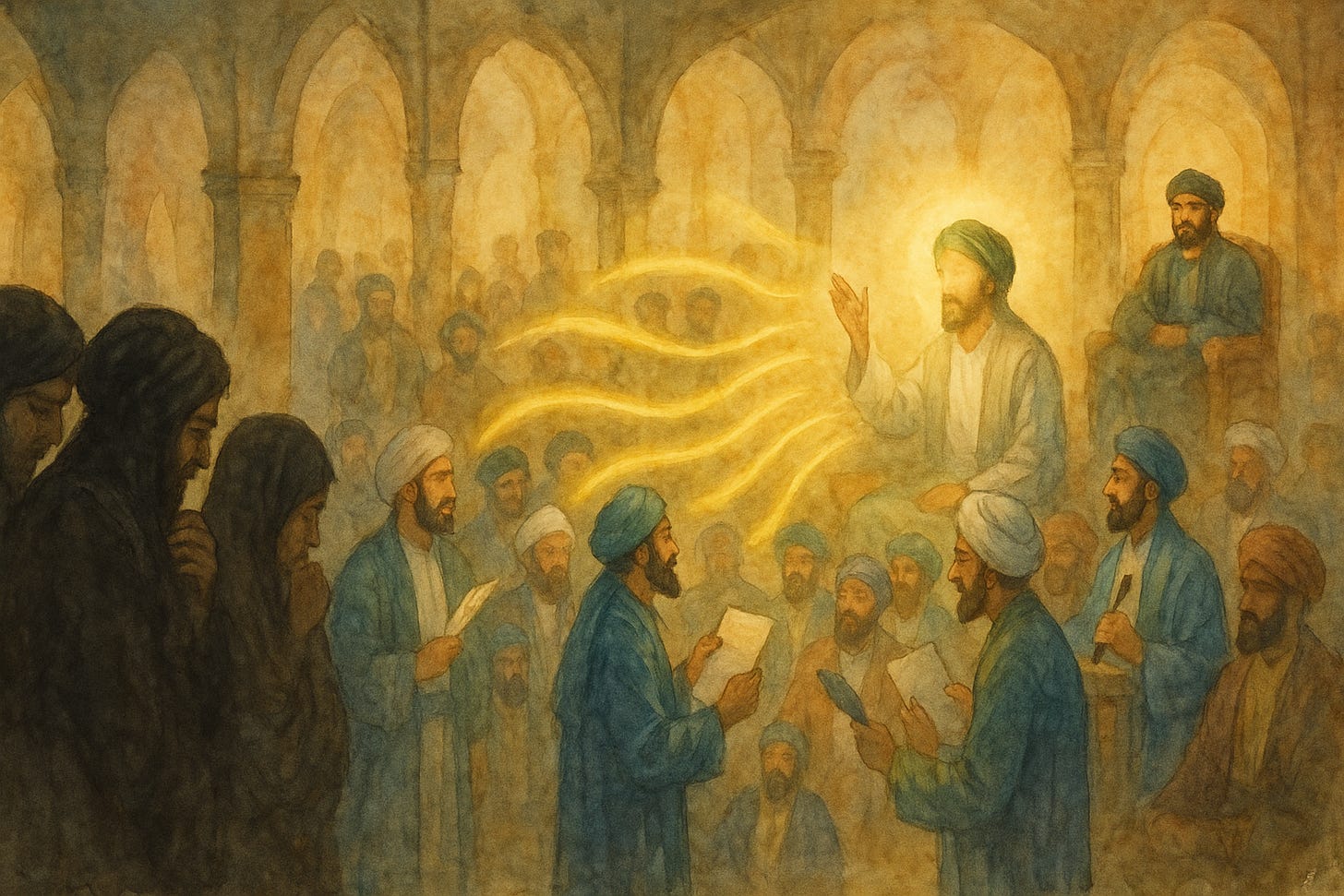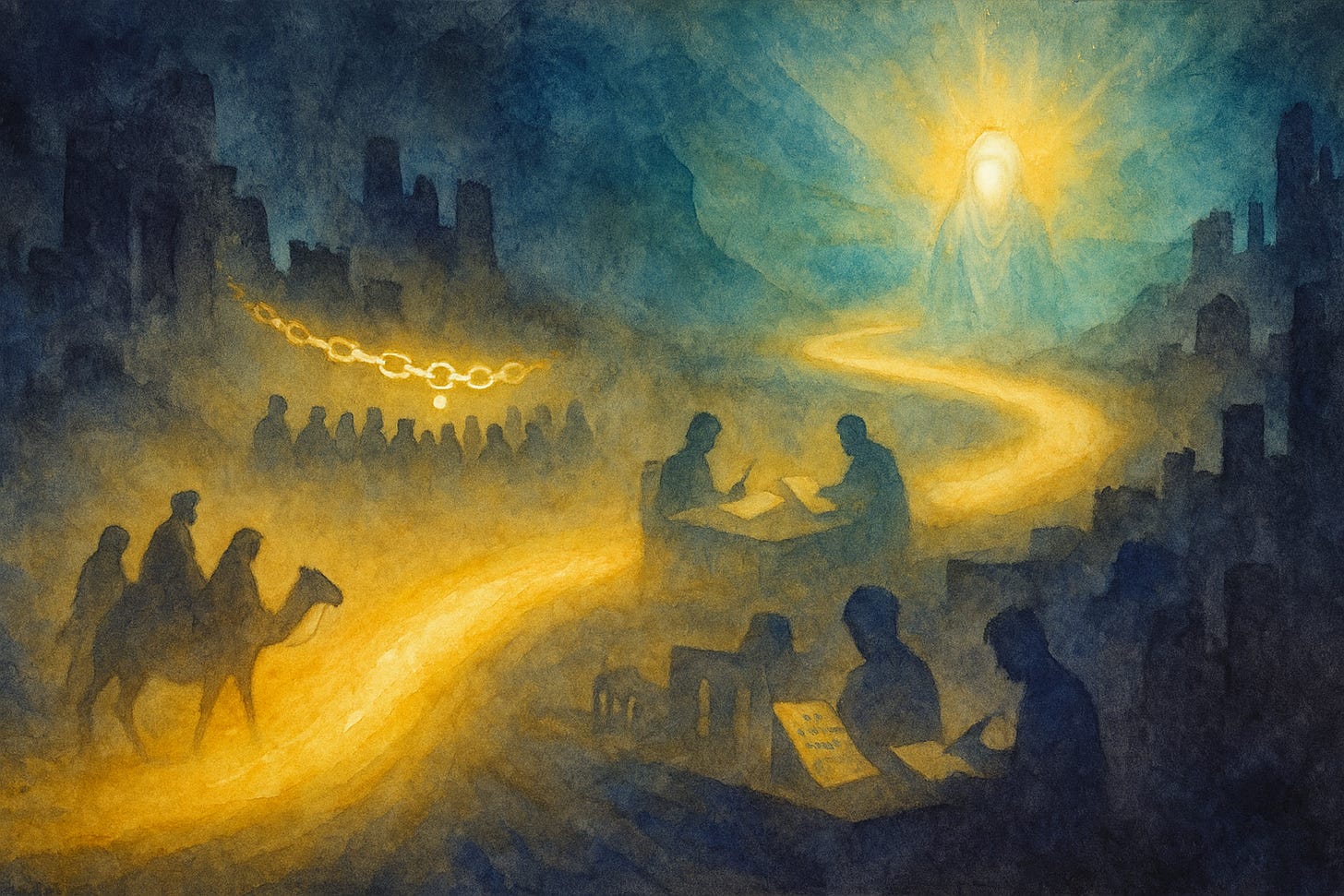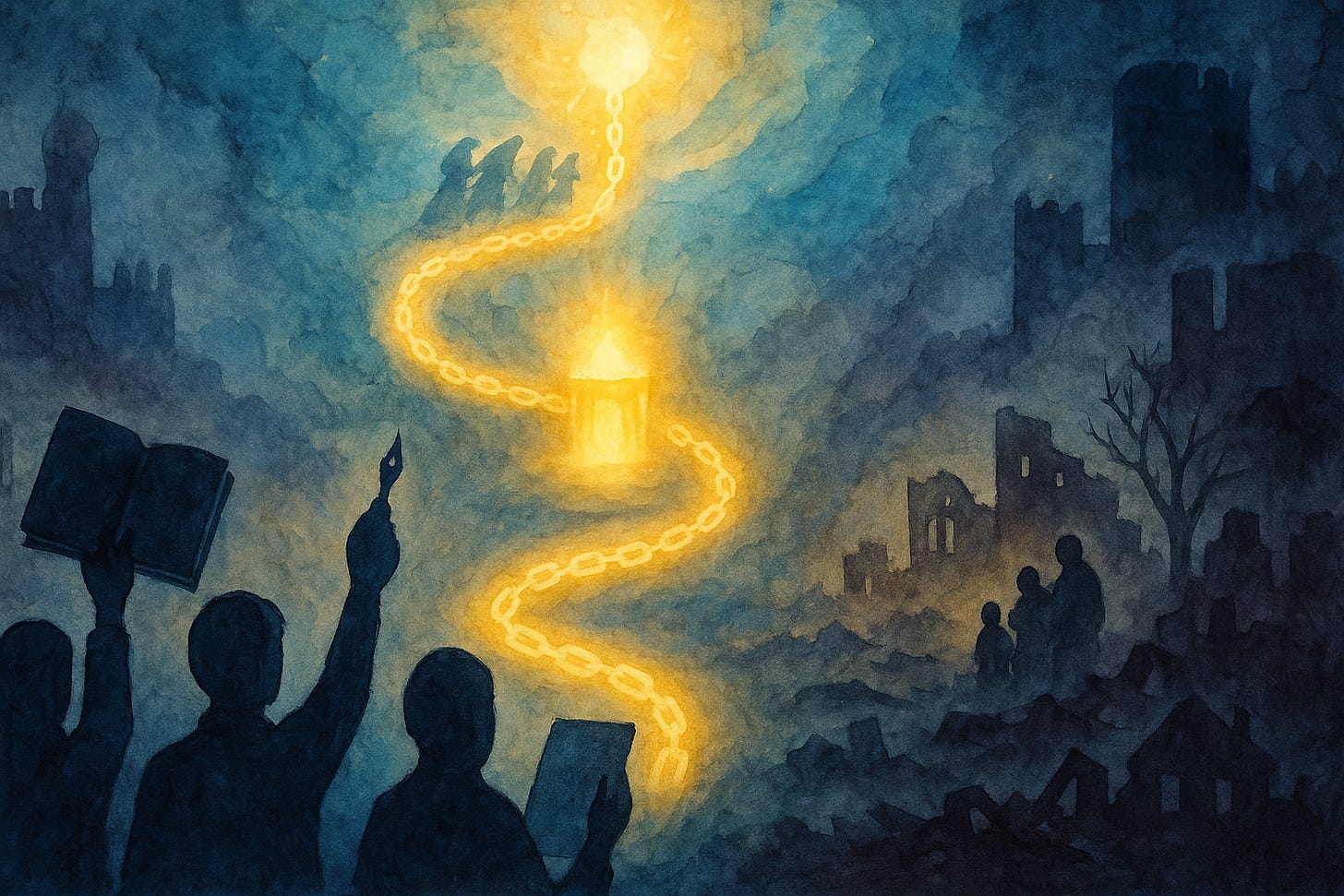[34] Imamah (Leadership) - Imam al-Ridha - Part 2: From Containment to Amplification
A series of discussions on the teachings of Imam Sadiq (sixth Imam of the Muslims), from the book Misbah ash-Sharia (The Lantern of the Path)
In His Name, the Most High
This is part thirty-four of our ongoing series of discussions on the book attributed to Imam al-Sadiq entitled Misbah ash-Sharia (The Lantern of the Path).
In our previous session, we began a new stage in these Wednesday Majalis. The format shifted from attempting to encompass everything at once to a more focused and layered method, unfolding the life and mission of each Imam step by step.
The previous session - session 33 - opened this journey with Imam al-Ridha (peace be upon him), setting the stage for four sessions that will examine his trials and strategy in depth. Today, in the second of these four, we move further along that path.
Our aim is to continue with the three-point method introduced last time: selecting three central themes, grounding them in the Quran, the sayings of the Ahl al-Bayt, and the insights of scholars, before concluding each point with a call to clarify — practical lessons for our own lives.
As always, this session builds upon the last.
The threads of our discussions are cumulative, weaving into a larger whole. For this reason, I encourage you to revisit the previous part if you have not already, so the continuity and connections can be properly appreciated.
With this foundation in mind, we now turn to the next chapter in the life of Imam al-Ridha, to uncover how his Imamate illuminates both his time and ours.
The previous parts can be found here:
Video of the Majlis (Sermon/Lecture)
This is the video presentation of this write-up as a Majlis (part of the Truth Promoters Weekly Wednesday Majlis Program)
Audio of the Majlis (Sermon/Lecture)
This is the video presentation of this write-up as a Majlis (part of the Truth Promoters Weekly Wednesday Majlis Program)
Recap
Imam al-Ridha – From Chains to Chessboard
Our last session introduced the new three-point, tightly focused format and transitioned from the ordeal of Imam Musa al-Kadhim to the mandate of his successor, Imam Ali ibn Musa al-Ridha (peace be upon them).
We traced how the contest over Imamah shifted from overt persecution to the subtler theatre of political co-option — and how the Imam met it.
The Sun Behind the Clouds: A Strategy of Silence
After his father’s martyrdom in Harun’s dungeons, Imam al-Ridha’s early leadership unfolded under suffocating surveillance. His “silence” was not absence but taqiyyah — deliberate, protective strategy to preserve the axis of guidance.
We read this through the Quranic grammar of Imamah: leadership established by sabr (patience under trial) and yaqeen (certainty in God’s signs), not by worldly conquest.
This became a rehearsal for our present: the ghaybah, where the Imam guides like the sun veiled by clouds — demanding loyalty even when unseen.
The Caliph's Gambit: A Gilded Cage
Ma’mun, having learned that the sword multiplies martyrs, tried a subtler blade: succession.
By naming the Imam heir-apparent, he aimed to neutralise Shi‘ism’s revolutionary charge, launder Abbasid legitimacy, cage the Imam in protocol, and sever him from his base — the timeless tactic of cloaking oppression in religious language.
The defence against such sanctified deception is basirah: trained insight that sees through pious branding.
The Imam’s Opening Move: Turning Trap into Platform
The Imam exposed the plot from the outset, framing the summons as a march towards martyrdom.
He refused the role; only under threat of death did he accept — and then on terms that emptied it of power: no appointments, no dismissals, no judgements, no command.
Thus the “crown” became a mirror of humiliation for Ma’mun. Court debates turned into minbars of tabyeen; abstention itself became the most eloquent sermon.
The core lesson: sometimes withholding legitimacy is the highest form of witness.
Contemporary Mirror & Calls to Clarify
Today, too, institutions weaponise religious form to varnish injustice. The greater danger is often co-option, not persecution.
Our charge: cultivate basirah (insight), resist being instrumentalised, refuse legitimacy to oppression in thought, word, and deed, and turn every imposed stage into a platform for truth — remembering the warning from Imam al-Kadhim’s era that ritual without living loyalty fails the Imam of one’s time.
From Madinah’s Farewell to Nishapur’s Golden Chain and Marv’s Clarification
With this groundwork, this session moves from principle to movement: the forced journey from Madinah to Marv; the farewell that foretold martyrdom; the Golden Chain narration at Nishapur; and the court debates that turned Ma’mun’s theatre into a spotlight of proof — how compulsion became da‘wah, and a gilded cage became a classroom of hearts.
In His most beautiful Name, and with full trust in His support, we move forward…
Imamah (Leadership) – Imam al-Ridha: From Containment to Amplification
From Farewell to Golden Chain, From Journey to Pulpit
He left Madinah knowing he would not return. At the Prophet’s grave, he wept and bore witness to his own path:
إِنِّي أُخْرَجُ مِنْ جِوَارِ جَدِّي صَلَّى اللَّهُ عَلَيْهِ وَآلِهِ خَارِجًا وَلَا أَرْجِعُ إِلَيْهِ أَبَدًا
I am being taken away from the neighbourhood of my grandfather, peace be upon him and his family, and I will never return to him again.
— Al-Saduq, Uyun Akhbar al-Ridha, Volume 2, Page 192
— Al-Majlisi, Bihar al-Anwar, Volume 49, Page 198
What Ma’mun dressed as honour, the Imam (peace be upon him) named plainly: a funeral procession in slow motion. Yet this cortege did not dim the light — it spread it.
Every mile of the coerced road became a minbar; every pause, a lesson; every crowd, a covenant renewed.
The Quran teaches that leadership is secured not by thrones but by the twin pillars of trial and certainty:
وَجَعَلْنَا مِنْهُمْ أَئِمَّةً يَهْدُونَ بِأَمْرِنَا لَمَّا صَبَرُوا وَكَانُوا بِآيَاتِنَا يُوقِنُونَ
“We made from among them leaders who guide by Our command when they had been patient and had conviction in Our signs.”
— Quran, Surah al-Sajdah (the Chapter of Prostration) #32, Verse 24
Thus, the route Ma’mun curated to avoid Shia strongholds became the Imam’s travelling classroom. Sanctuary was not a place to be left behind; it was a covenant carried within.
And then Nishapur — a city halted by longing. The scholars’ pens thickened the air; the streets strained for a single chain of light.
He recited the narration whose links bind heaven to earth:
قَالَ اللهُ جَلَّ جَلَالُهُ: كَلِمَةُ لَا إِلٰهَ إِلَّا اللهُ حِصْنِي، فَمَنْ دَخَلَ حِصْنِي أَمِنَ مِنْ عَذَابِي.
فَلَمَّا مَضَتِ الرَّاحِلَةُ نَادَانَا: بِشُرُوطِهَا، وَأَنَا مِنْ شُرُوطِهَا.God Almighty said: “The statement ‘la ilaha illa Allah’ (there is no god, except The God) is My fortress; whoever enters My fortress is safe from My punishment.”
Then, as the mount moved away, [the Imām] called out:“With its conditions — and I am one of its conditions.”
— Al-Saduq, Uyun Akhbar al-Ridha, Volume 2, Page 138 (Chapter on the Silsilat adh-Dhahab Narration)
— Al-Kulayni, Al-Kafi, Volume 1, Kitab al-Tawheed (the Chapter of Monotheism), Page 23
— Al-Majlisi, Bihar al-Anwar, Volume 49, Page 126
— Al-Hurr Al-Ameli, Wasa’il al-Shia, Volume 4, Page 1072
In one breath, he stitched tawheed to wilayah; in one condition, he unveiled that salvation is allegiance to God through obedience to His Proof.
This is how thrones become traps and journeys become pulpits. This is how coerced movement turns into da‘wah (advocacy, invitation, missionary work), and how the gilded cage prepares the loudest clarifications: debates in Marv where scripture, reason, and mercy will unmask power’s costume and give the voice of tashayyu (shi’ism) a public timbre again.
An Invitation to Martyrdom: The Imam's Summons to Marv
When Imam al-Ridha (peace be upon him) was summoned from Madinah to Marv, it was presented by Ma’mun as an honour. But the Imam knew — and he made sure the people also knew — that this was no honour, but the journey of his martyrdom.
At the grave of his grandfather, the Prophet Muhammad (peace and blessings be upon him and his family), he wept and declared:
إِنِّي أُخْرَجُ مِنْ جَوَارِ جَدِّي صَلَّى اللَّهُ عَلَيْهِ وَآلِهِ خَارِجًا وَلَا أَرْجِعُ إِلَيْهِ أَبَدًا
“I am being taken away from the neighbourhood of my grandfather, peace be upon him and his family, and I will never return to him again.”
— Al-Saduq, Uyun Akhbar al-Ridha, Volume 2, Page 192
— Al-Majlisi, Bihar al-Anwar, Volume 49, Page 326
— Ibn Shahrashub, Manaqib Aal Abi Talib, Volume 4, Page 362
He also performed tawaf around the Ka‘bah, bidding farewell as though to his own life. His companions understood: the road ahead was not a road of return.
Every Street a Minbar: Turning Exile into an Opportunity
Ma’mun had carefully designed the route of the journey. He avoided Shia strongholds like Kufa and Qom, fearing that if the Imam passed through them, mass uprisings could erupt. Instead, he directed the caravan through cities where Abbasid influence was stronger and Shia presence weaker.
But this strategy backfired. For every city the Imam passed through, he turned the streets into a minbar. Every gathering became a da‘wah, every pause a lesson, every du‘a a declaration. Even in regions Ma’mun thought safe, the light of the Imam could not be contained.
The Quran describes this dynamic of exile and enforced journeys:
قَالُوا إِن نَّتَّبِعِ الْهُدَىٰ مَعَكَ نُتَخَطَّفْ مِنْ أَرْضِنَا ۚ أَوَلَمْ نُمَكِّن لَّهُمْ حَرَمًا آمِنًا يُجْبَىٰ إِلَيْهِ ثَمَرَاتُ كُلِّ شَيْءٍ
They said, ‘If we follow the guidance with you, we will be snatched from our land.’ But have We not established for them a secure sanctuary to which fruits of all things are brought?
— Quran, Surah al-Qasas (The Chapter of the Narratives) #28, Verse 57
The Imam’s journey was meant to strip him of sanctuary, to uproot him from Madinah, to isolate him. But just as the Quran reminds, security comes not from territory but from the covenant of God. Imam al-Ridha carried that covenant wherever he went.
The Wilayah in Exile: A Proclamation of Authority and Love
In Ahwaz, the Imam recited verses of Imamate. In Basra, he confronted hearts that had grown hard against the Ahl al-Bayt. In every stop, he met people, prayed with them, spoke to them, healed their doubts. What was intended as exile became proclamation.
The Quran describes the mission of prophets on their journeys:
وَجَعَلْنَا فِي ذُرِّيَّتِهِمْ النُّبُوَّةَ وَالْكِتَابَ ۖ فَمِنْهُم مُّهْتَدٍ وَكَثِيرٌ مِّنْهُمْ فَاسِقُونَ
ثُمَّ قَفَّيْنَا عَلَىٰ آثَارِهِم بِرُسُلِنَا وَقَفَّيْنَا بِعِيسَى ابْنِ مَرْيَمَ وَآتَيْنَاهُ الْإِنجِيلَWe placed prophethood and the Book among their descendants: some of them were guided, though many were transgressors.
Then We followed them with Our messengers, and followed them with Jesus, son of Mary, and gave him the Gospel.— Quran, Surah al-Hadid (The Chapter of the Iron) #57, Verses 26–27
The Imams are the inheritors of this chain. Just as prophets carried the message across lands, Imam al-Ridha carried the wilayah across the Abbasid empire — in chains, in exile, yet unstoppable.
To this Quranic inheritance we add three further anchors, which the Imam’s words and actions made manifest:
قُل لَّا أَسْأَلُكُمْ عَلَيْهِ أَجْرًا إِلَّا الْمَوَدَّةَ فِي الْقُرْبَىٰ
“Say: I do not ask you any reward for it except love for my near relatives.”
— Quran, Surah al-Shura (the Chapter of the Consultation) #42, Verse 23
And also we learn about the position of the Imam from:
إِنَّمَا يُرِيدُ اللَّهُ لِيُذْهِبَ عَنكُمُ الرِّجْسَ أَهْلَ الْبَيْتِ وَيُطَهِّرَكُمْ تَطْهِيرًا
“Indeed, God only desires to remove all impurity from you, O People of the House, and to purify you completely.”
— Quran, Surah al-Ahzaab (the Chapter of the Confederates) #33, Verse 33
Furthermore, of our duties regarding the Ahl al-Bayt:
يَا أَيُّهَا الَّذِينَ آمَنُوا أَطِيعُوا اللَّهَ وَأَطِيعُوا الرَّسُولَ وَأُولِي الْأَمْرِ مِنكُمْ
“O you who have faith! Obey God, and obey the Messenger, and those vested with authority among you.”
— Quran, Surah al-Nisa (the Chapter of the Women) #4, Verse 59
These verses frame the Imam’s journey not as exile but as testimony: wherever he walked, he clarified who the Ahl al-Bayt were, what purity God had granted them, and what obedience was due to them.
From Humiliation to Proclamation: Imam Khamenei's Reflection on the Journey
Imam Khamenei reflected on this journey:
امام رضا (عليهالسلام) اين سفر تحميلی را به منبرى برای تبيين تبديل كردند؛ هر منزلى براى معرفى امامت و نشر ولايت فرصتی شد.
Imam al-Ridha (peace be upon him) transformed his imposed journey into a pulpit of clarification; every stop was an opportunity to define Imamate and spread wilayah.
— Imam Khamenei, Speech in Mashhad, September 2, 2000 (Shahrivar 11, 1379), Birth Anniversary of Imam al-Ridha
What was intended as humiliation became proclamation. What was meant to silence became testimony.
Lessons for the Present: From Sacred Exile to Modern Resistance
In our own times, forced journeys have become symbols of resistance. Refugees expelled from their homes, families displaced by war, captives marched from their land — all these echo Imam al-Ridha’s journey.
And just as he transformed exile into da‘wah, so too must we transform our imposed circumstances into witness. Palestinians expelled from Gaza, Yemenis under siege, Kashmiris under occupation — each injustice must be turned into proclamation.
Call to Clarify: Recognising the Truth in Our Own Exile
Recognise that exile does not silence truth; it spreads it.
Understand that every forced journey can be transformed into a minbar of da‘wah.
See in Imam al-Ridha’s march from Madinah to Marv the same struggle faced by the oppressed today — and commit to turning their pain into proclamation.
Remember that in the ghaybah of Imam al-Mahdi (may God hasten his reappearance), every imposed hardship is also an opportunity to clarify and spread truth.
Nishapur and the Golden Chain
The most luminous moment of the Imam’s journey was his arrival at Nishapur. This was not a mere stop along the road — it became one of the most significant gatherings of the early Abbasid era.
“And I Am One of Its Conditions”: The Proclamation that Defined Wilayah at Nishapur
Thousands gathered to see him. Historians say the scholars of hadith filled the streets, each eager to hear directly from the grandson of the Prophet. Abu Zur’ah and Muhammad ibn Aslam al-Tusi, two renowned hadith masters, were among those present, their pens ready. The crowd was so great that it brought the caravan to a halt.
It was here that Imam al-Ridha delivered the famous narration known as the Hadith al-Silsilat al-Dhahab — the Golden Chain.
قَالَ حَدَّثَنِي أَبِي مُوسَى بْنُ جَعْفَرٍ، قَالَ حَدَّثَنِي أَبِي جَعْفَرُ بْنُ مُحَمَّدٍ، قَالَ حَدَّثَنِي أَبِي مُحَمَّدُ بْنُ عَلِيٍّ، قَالَ حَدَّثَنِي أَبِي عَلِيُّ بْنُ الْحُسَيْنِ، قَالَ حَدَّثَنِي أَبِي الْحُسَيْنُ بْنُ عَلِيٍّ، قَالَ حَدَّثَنِي أَبِي عَلِيُّ بْنُ أَبِي طَالِبٍ، قَالَ حَدَّثَنِي رَسُولُ اللهِ صَلَّى اللهُ عَلَيْهِ وَآلِهِ، قَالَ: قَالَ جَبْرَئِيلُ: قَالَ اللهُ جَلَّ جَلَالُهُ:
كَلِمَةُ لَا إِلَهَ إِلَّا اللهُ حِصْنِي، فَمَنْ دَخَلَ حِصْنِي أَمِنَ مِنْ عَذَابِي“My father Musa ibn Ja‘far told me, who was told by his father Ja‘far ibn Muhammad, who was told by his father Muhammad ibn Ali, who was told by his father Ali ibn al-Husayn, who was told by his father al-Husayn ibn Ali, who was told by his father Ali ibn Abi Talib, who was told by the Messenger of God (peace and blessings be upon him and his family), who was told by Gabriel, who was told by God, the Majestic:
‘The statement La ilaha illa Allah (there is no god but The God) is My fortress; whoever enters My fortress is safe from My punishment.’”
— Al-Saduq, Uyun Akhbar al-Ridha, Volume 2, Page 138
— Al-Kulayni, Al-Kafi, Volume 1, Kitab al-Tawheed (the Book of Monotheism), Page 23, Hadeeth 1
— Al-Majlisi, Bihar al-Anwar, Volume 49, Page 126
— Al-Hurr Al-Ameli, Wasa’il al-Shia, Volume 4, Page 1072
As the caravan began to move, Imam al-Ridha called out:
بِشُرُوطِهَا، وَأَنَا مِنْ شُرُوطِهَا
“With its conditions — and I am one of its conditions.”
— Al-Saduq, Uyun Akhbar al-Ridha, Volume 2, Page 138
— Al-Kulayni, Al-Kafi, Volume 1, Kitab al-Tawheed (the Book of Monotheism), Page 23, Hadeeth 1
— Al-Majlisi, Bihar al-Anwar, Volume 49, Page 126
— Al-Hurr Al-Ameli, Wasa’il al-Shia, Volume 4, Page 1072
The crowd erupted. The scholars wept, recording this testimony. For in a single phrase, the Imam had unveiled the heart of wilayah: salvation is not found in words alone, but in loyalty to the Imam who is God’s proof on earth.
More Than a Declaration: The Quranic Proof that Faith Must Be Tested
This statement echoes the Quran’s teaching that faith without obedience is incomplete:
أَحَسِبَ النَّاسُ أَن يُتْرَكُوا أَن يَقُولُوا آمَنَّا وَهُمْ لَا يُفْتَنُونَ
وَلَقَدْ فَتَنَّا الَّذِينَ مِن قَبْلِهِمْ ۖ فَلَيَعْلَمَنَّ اللَّهُ الَّذِينَ صَدَقُوا وَلَيَعْلَمَنَّ الْكَاذِبِينَ“Do people suppose they will be left to say, ‘We have faith,’ without being tested?
Certainly We tested those before them, so God shall surely ascertain those who are truthful, and He shall surely ascertain the liars.”— Quran, Surah al-Ankabut (The Chapter of the Spider) #29, Verses 2–3
The Imam clarified that the condition of true faith is not mere verbal declaration but allegiance to the divinely appointed Imam.
An Incomplete Fortress: Why Monotheism without Imamate is Not Enough
Imam Khomeini reflected on this narration:
كلمهٔ «لا إله الا الله» يك كلمه نيست كه فقط به زبان گفته شود، بلكه حصنى است كه شرايطى دارد، و اولين شرط آن ولايت است.
“The phrase La ilaha illa Allah is not merely a word spoken by the tongue. It is a fortress that has conditions, and the first of these conditions is wilayah.”
— Imam Khomeini, Sahifeh-ye Imam, Volume 15, Page 201
Ayatullah Jawadi-Amoli added:
اگر توحید بدون امامت تفسیر شود، معنای آن ناقص است؛ و اگر امامت بدون توحید تفسیر شود، معنای آن مشوّه و تحریفشده است.
“If tawheed is interpreted without Imamate, its meaning is incomplete; if Imamate is interpreted without tawheed, it is distorted.”
— Ayatullah Jawadi-Amoli, Tafsir-e Tasnim, Volume 13, commentary on Quran, Surah al-Ankabut (the Chapter of the Spider) #29, Verses 2-3
Thus, the Imam’s words at Nishapur preserved the unity of tawheed and wilayah, making clear that salvation requires both.
The Roar of the Golden Chain: How a Single Narration Became a Quranic Proclamation
The narration spread like wildfire. Reports say that twenty thousand pens recorded it. For the Shia, it was a proclamation of their creed. For the wider Muslim community, it was an awakening. A movement Ma’mun had tried to suffocate was suddenly roaring across the empire, carried not by swords but by a single chain of words.
And the chain was golden — not only for its purity of transmission (from God to Jibreel to the Prophet to the Imams), but for its binding of heaven to earth.
A Quranic Manifestation: How Love, Purity, and Obedience Converge in the Imam
The Imam’s declaration “I am one of its conditions” is not an isolated claim. It is rooted in the Quran itself:
قُل لَّا أَسْأَلُكُمْ عَلَيْهِ أَجْرًا إِلَّا الْمَوَدَّةَ فِي الْقُرْبَىٰ
“Say: I do not ask you any reward for it except love for my near relatives.”
— Quran, Surah al-Shura (the Chapter of the Consultation) #42, Verse 23
And again more we learn about the status of the Ahl al-Bayt:
إِنَّمَا يُرِيدُ اللَّهُ لِيُذْهِبَ عَنكُمُ الرِّجْسَ أَهْلَ الْبَيْتِ وَيُطَهِّرَكُمْ تَطْهِيرًا
“Indeed, God only desires to remove all impurity from you, O People of the House, and to purify you completely.”
— Quran, Surah al-Ahzaab (the Chapter of the Confederates) #33, Verse 33
And about what our duties and responsibilities are regarding them:
يَا أَيُّهَا الَّذِينَ آمَنُوا أَطِيعُوا اللَّهَ وَأَطِيعُوا الرَّسُولَ وَأُولِي الْأَمْرِ مِنكُمْ
“O you who have faith! Obey God, and obey the Messenger, and those vested with authority among you.”
— Quran, Surah al-Nisa (the Chapter of the Women) #4, Verse 59
Together, these verses show that love, purification, and obedience converge in one locus: the Imam from the Prophet’s family. Nishapur was therefore not only a hadith gathering but a Quranic manifestation.
Sidebar: From Lament to Resistance: How Poetry Gave Voice to the Imam's Proclamation
In the wake of the Golden Chain, poets like De’bal al-Khuza’i gave cultural voice to the Imam’s message.
His famous ode (qasidah) turned lament into resistance:
أفاطمُ قومي يا ابنةَ الخيرِ واندُبي
نجُومَ سُعودٍ خرَّ مِن بعدِ ما علاقبورٌ بكوفانٍ وأُخرى بطيبةٍ
وأُخرى بفخٍّ نالَها صَلْصَلُ البلَىوقبرٌ بطوسٍ يا لها من مصيبةٍ
تُوقِدُ في الأحشاءِ من حرِّها البلاO Fatimah! Rise, O daughter of goodness, and lament
The Stars of Guidance that once shone so high, now fallen low.Some lie buried at Kufa, and others at Taybah (Madinah),
And others in Fakh — worn down by tribulation.And one in Tus — O what a calamity!
That sets ablaze the soul with a fire that never dies.”— Ansari Qummi, Diwan De’bal al-Khuza’i, Page 145
— Al-Majlisi, Bihar al-Anwar, Volume 45, Page 257-258
— Al-Sabbaan, Asr Abbasi (On Shia Poetry under the Abbasids), Pages 372-274
Through such verses, the vilification against Ahl al-Bayt was overturned. Public memory was reclaimed, and the voice of the Imamate resounded in every marketplace and gathering.
Lessons for the Present: Fulfilling the Condition in the Age of Ghaybah
In our own time, many proclaim faith in God while ignoring the covenant of wilayah. The Golden Chain reminds us that slogans are not enough; loyalty to the Imam of the age is the condition of salvation.
This is our test in the ghaybah of Imam al-Mahdi (may God hasten his reappearance). To declare “La ilaha illa Allah” (there is no god, except The God) is to also live by its condition — obedience to the hidden Imam, preparing for his return, and clarifying his truth to a world clouded by deception.
Call to Clarify: Living as People of the Golden Chain
Understand that La ilaha illa Allah (there is no god, except The God) is not a slogan but a fortress, with wilayah as its gate.
Recognise that Nishapur’s Golden Chain ties tawheed to Imamate inseparably.
Clarify in our time that loyalty to God requires loyalty to the Imam of the age.
Live as people of the Golden Chain: witnesses whose words and deeds proclaim both tawheed and wilayah.
The Caliph's Gambit: The Great Debates in the Court of Marv
When Imam al-Ridha (peace be upon him) finally reached the heart of Ma’mun’s power, the court of Marv, the Caliph tried to turn him into a trophy. He arranged for debates with scholars of every persuasion — Sunni theologians, Christian priests, Jewish rabbis, Zoroastrian mobads. The intention was to overwhelm the Imam, to expose him as a sectarian figure who could not stand before the intellectual elite of the empire.
But the result was the opposite.
In the Best of Manners: How the Imam Embodied the Quranic Ethic of Debate
Shaykh al-Saduq records in Uyun Akhbar al-Ridha entire sessions where the Imam dismantled his opponents with calm reasoning and scriptural evidence.
Against the Christians, he argued from the Gospels themselves; against the Jews, from the Torah; against the Zoroastrians, from reason and history.
Every opponent left defeated, and the courtiers marvelled at his knowledge.
The Quran describes this prophetic method:
ادْعُ إِلَىٰ سَبِيلِ رَبِّكَ بِالْحِكْمَةِ وَالْمَوْعِظَةِ الْحَسَنَةِ وَجَادِلْهُم بِالَّتِي هِيَ أَحْسَنُ
“Invite to the way of your Lord with wisdom and good advice, and dispute with them in the best manner.”
— Quran, Surah al-Nahl (The Chapter of the Bee) #16, Verse 125
And elsewhere:
وَلَا تُجَادِلُوا أَهْلَ الْكِتَابِ إِلَّا بِالَّتِي هِيَ أَحْسَنُ
“Do not dispute with the People of the Book except in the best manner.”
— Quran, Surah al-Ankabut (The Chapter of the Spider) #29, Verse 46
Imam al-Ridha embodied this Quranic ethic.
He did not humiliate his opponents, but guided them through their own texts, showing that truth is universal, and that the light of the Ahl al-Bayt is not confined to one community.
Not Entertainment, But Leadership: The Sacred Role of Art Under the Imam's Patronage
Alongside debate came poetry. Poets like De’bal al-Khuza’i and Abu Nuwas composed verses in the Imam’s honour. De’bal recited before him lines that became rallying cries of Shia identity.
The Prophetic Poem and the Imam's Response
When De'bal recited his poem, which catalogues the tragedies that befell the Ahl al-Bayt and lists the locations of their sacred graves, the Imam (عليه السلام) wept profusely. When De'bal reached the lines describing the grave of the Imam's father, Musa al-Kadhim (عليه السلام), in Baghdad, the Imam directly addressed him to make a historic addition.
De'bal recited:
وقبرٌ بِبَغدادَ لِنَفسٍ زَكيَّةٍ
تَضَمَّنَها الرَحمنُ في الغُرُفاتِAnd a grave in Baghdad for a soul most pure, Whom the All-Merciful has enveloped in the highest chambers.
— Al-Saduq, Uyun Akhbar al-Ridha, Volume 2, Chapter 58, Pages 263-267
At this point, Imam al-Ridha turned to the poet and said:
أفَلا أُلحِقُ لَكَ بِهذا المَوضِعِ بَيتَينِ، بِهِما تَمامُ قَصيدَتِكَ؟
Shall I not add to your poem, at this point, two verses by which it will be made complete?
— Al-Saduq, Uyun Akhbar al-Ridha, Volume 2, Chapter 58, Pages 263-267
De'bal eagerly replied, "Yes, O son of the Messenger of God!" The Imam then recited two verses prophesying his own martyrdom and burial place, effectively adding his own story to the epic poem of his ancestors.
وَقَبرٌ بِطوسٍ يا لَها مِن مُصيبَةٍ
أَلَحَّت عَلى الأَحشاءِ بِالزَفَراتِ
إِلى الحَشرِ حَتّى يَبعَثَ اللهُ قائِماً
يُفَرِّجُ عَنّا الهَمَّ وَالكُرُباتِAnd a grave in Tus—oh, what a calamity!
It has kindled in the depths of the soul sighs of sorrow.
Until the Resurrection, when God shall raise a Qa'im (a Riser),
Who will relieve us of all grief and affliction.— Al-Saduq, Uyun Akhbar al-Ridha, Volume 2, Chapter 58, Pages 263-267
The Highest Praise and a Sacred Gift
After De'bal finished, the Imam offered him a gift of one hundred dinars. De'bal refused the money, saying:
فَلَمَّا أَنْشَدَ دِعْبِلٌ قَصِيدَتَهُ عَلَى الإمام الرِّضا (ع) سُرَّ بِهَا وَأَعْطَاهُ مِائَةَ دِينَارٍ، فَقَالَ دِعْبِلٌ: وَاللهِ مَا قُلْتُهَا طَلَباً لِلدُّنْيَا، وَمَا أَخَذْتُ عَلَيْهَا جُعْلًا قَطُّ، وَلَكِنْ سَأَلْتُكَ أَنْ تُعْطِيَنِي مِنْ ثَوْبِكَ شَيْئاً أَجْعَلُهُ كَفَناً لِي. فَأَعْطَاهُ جُبَّتَهُ الشَّخْصِيَّةَ مَعَ الدَّرَاهِمِ.
When De’bal recited his poem before Imam al-Ridha, the Imam was pleased with it and gave him one hundred dinars. De’bal said: ‘By God, I did not compose it for worldly wealth, and I have never taken payment for it; but I ask you to grant me something from your own garment, that I may keep it as my burial shroud for blessing.’ So the Imam gave him his own personal cloak together with the dinars.
— Al-Sadiq, Uyun Akhbar al-Ridha, Volume 2, Page 263
— Al-Majlis, Bihar al-Anwar, Volume 49, Page 91
More important than any material gift was the spiritual affirmation the Imam bestowed upon him.
He revealed the divine source of De'bal's poetic inspiration, saying to him:
إنَّ روحَ القُدُسِ نَطَقَ عَلى لِسانِكَ بِهذَينِ البَيتَينِ
Truly, the Holy Spirit (Ruh al-Qudus) has spoken upon your tongue with these two verses.
— Al-Saduq, Uyun Akhbar al-Ridha, Volume 2, Chapter 58, Pages 263-267
He was referring to the opening verses of De'bal's poem. In another narration of the same event, the Imam reinforces this praise after hearing the entire poem, declaring:
آمَنَكَ اللهُ يَومَ الفَزَعِ الأَكبَرِ
“May God grant you security on the Day of the Greatest Terror.”
— Al-Irbili, Kashf al-Ghummah Fi Ma’rifat al-Aimmah, Volume 2, Chapter On the Virtues and Miracles of Imam al-Ridha
This interaction shows that Imam al-Ridha viewed De'bal not merely as a skilled poet, but as a divinely-inspired advocate for the Ahl al-Bayt, whose words were a vehicle for sacred truth.
The Poet of Wine and the People of the House
A celebrated, if controversial, figure of the era was Abu Nuwas, famed for his libertine wine-poetry (khamriyyat) and sharp satire.
Yet, in a striking paradox of his literary persona, he also composed verses of profound reverence for the Ahl al-Bayt.
A famous report from the court of Caliph Al-Ma'mun captures this perfectly.
When asked why he had not praised the Imam, Abu Nuwas claimed he was holding back out of awe. However, as Imam al-Ridha was departing, Abu Nuwas approached and spontaneously recited a poem of such theological depth that the Imam stopped and declared:
قَد جِئتَ بِأَبياتٍ ما سَبَقَكَ إِلَيها أَحَدٌ... يا غُلامُ، أَعطِهِ ما مَعَكَ
You have recited verses the likes of which no one has composed before... O servant, give him what we have with us.
— Al-Saduq, Uyun Akhbar al-Ridha, Volume 2, Chapter 41
The Imam then gifted Abu Nuwas his own horse.
The Imam's praise—stating that no one had preceded him in composing such verses—and his subsequent generosity are considered the highest form of affirmation for a poet.
The verses that earned such high praise were these:
مُطَهَّرونَ نَقِيّاتٌ ثِيابُهُمُ
تَجري الصَلاةُ عَلَيهِم أَينَما ذُكِروا
مَن لَم يَكُن عَلَوِيّاً حينَ تَنسُبُهُ
فَما لَهُ مِن قَديمِ الدَهرِ مُفتَخَرُ
فَاللهُ لَمّا بَرا خَلقاً فَأَتقَنَهُ
صَفّاكُمُ وَاِصطَفاكُم أَيُّها البَشَرُ
فَأَنتُمُ المَلَأُ الأَعلى وَعِندَكُمُ
عِلمُ الكِتابِ وَما جاءَت بِهِ السُوَرُThey are the purified ones, their garments immaculate,
Blessings are invoked upon them, wherever their names are recalled.
He who cannot trace his lineage to Ali,
Has no primordial honour of which to boast.
For when God fashioned creation in its perfection,
He chose you and selected you from all humankind.
For you are the Celestial Assembly, and with you rests
The knowledge of the Scripture, and all that the sacred verses contain.— Al-Saduq, Uyun Akhbar al-Ridha, Volume 2, Chapter 41, Pages 155-156
Soldiers of the Word: Poetry, Patronage, and the Ahl al-Bayt
The Quran itself commands love of the Prophet’s family:
قُل لَّا أَسْأَلُكُمْ عَلَيْهِ أَجْرًا إِلَّا الْمَوَدَّةَ فِي الْقُرْبَىٰ
“Say: I do not ask you any reward for it except love for my near relatives.”
— Quran, Surah al-Shura (the Chapter of the Consultation) #42, Verse 23
The Imam’s presence gave new life to such voices. Under his patronage, poetry became not entertainment but da‘wah — a vehicle for clarifying truth, preserving memory, and spreading loyalty.
Imam Khamenei has often noted that cultural production — poetry, literature, song — is a battlefield of truth and falsehood:
فرهنگ، خطرناکترین میدان نبردِ حق و باطل است و شاعران و نویسندگان سربازان این میدانند
“Culture is the most dangerous battlefield in the struggle between truth and falsehood, and poets and writers are the soldiers of this field.”
— Imam Khamenei, Speech in a Meeting with Poets, July 17, 1995 (Tir 26, 1374 / Safar 19, 1416), Tehran
And as Ayatullah Jawadi-Amoli remarked:
فرهنگ صحیح سرگرمی نیست، بلکه قیادت و ولایت است
“Sound culture is not entertainment; it is leadership and guardianship.”
— Ayatullah Jawadi-Amoli, Tafsir-e Tasnim, Volume 10, Page 144
This was true in the court of Marv as much as in our world today.
From Containment to Amplification: The Unintended Consequence of Ma'mun's Forced Succession
Through debates and poetry alike, Shi‘ism found its voice. For decades it had survived underground, whispered in the secrecy of taqiyyah. Now, under the forced succession of Ma’mun, the voice of the Ahl al-Bayt rang publicly. People who had been afraid to even mention the names of Ali and Husayn in reverence were now hearing qasidahs (odes) in their praise sung openly in the palace of the Caliph.
What Ma’mun intended as containment became amplification.
Lessons for the Present: Transforming the Tools of the Powerful into Pulpits
In our own time, the arenas of debate and culture are again contested. Universities, media, literature, film, and music are often tools in the hands of the powerful. But Imam al-Ridha’s strategy shows us that these same platforms can be seized and transformed into pulpits of da‘wah (propagation, missionary work, advocacy).
To clarify truth today means to engage in debates with wisdom, to produce culture that preserves memory, to make art and poetry that defends the oppressed. The Imam did not retreat from the public sphere — he entered it, subverted it, and turned it into witness.
Call to Clarify: Transforming Modern Platforms into Voices of Wilayah
Recognise that debates and cultural production are not luxuries but battlefields of truth.
Use wisdom and respect in debate, but never compromise truth.
Support poets, writers, and artists who proclaim the cause of justice, as Imam al-Ridha supported Da‘bal.
Transform the cultural platforms of our age into voices of wilayah, linking every word back to the Imam of the time.
Conclusion
The coerced journey of Imam al-Ridha (peace be upon him) was meant to humiliate, isolate, and contain him. Yet by divine wisdom, it became one of the greatest proclamations of truth in the 250-year jihad of the Imams.
We saw how the Imam turned his exile from Madinah into a travelling pulpit. What Ma’mun intended as a funeral procession, the Imam transformed into da‘wah at every step.
We heard the thunder of Nishapur, where the Golden Chain revealed that La ilaha illa God is not salvation by words alone but by loyalty to the Imam who is its condition.
We witnessed the debates and poetry in Marv. What was meant to confine the Imam became an open stage where wilayah was clarified and Shi‘ism found its voice.
Together, these moments show us a map: exile can become proclamation, slogans must be tied to Imamate, and public platforms must be seized for truth.
For us today, these lessons converge in the ghaybah of Imam al-Mahdi (may God hasten his reappearance). His absence is our test, but also our opportunity.
Every exile, every hardship, every imposed stage can be transformed into da‘wah (call, advocacy, outreach).
Every debate, every cultural space can be clarified with wisdom. And every proclamation of faith must be tied to loyalty to the living Imam.
This was Imam al-Ridha’s legacy, and it is our mandate.
In the next session, God willing, we will see how the Abbasid scheme unravelled, how Shi’ism gained strength rather than weakness, and what jurisprudential lessons the Imam left us in the face of tyranny.
A Supplication-Eulogy for Imam al-Ridha - The Chain that Binds Heaven to Earth
In the Name of God, the All-Merciful, the All-Compassionate.
O God, send Your blessings upon Muhammad
and the family of Muhammad —
the fortress of tawheed,
the guardians of wilayah,
the chain that binds heaven to earth.Peace be upon you, O Ali ibn Musa al-Ridha,
O traveller dragged in sorrow, yet proclaiming truth at every step,
O voice of Nishapur, who declared that the fortress of La ilaha illa God has conditions,
O heir of Husayn, who turned exile into proclamation.You walked the roads chosen by your enemies,
but you filled them with da‘wah.
You were forced into exile,
but you turned exile into testimony.
You proclaimed the Golden Chain,
tying the word of tawheed to the covenant of wilayah.O Imam, we live in an age where false rulers still cloak themselves in religion,
where lies are broadcast as truth,
where slogans are used to justify oppression.
We see Gaza in ruins, its children starved, its people slaughtered.
We see Yemen besieged, Kashmir silenced, Iraq and Syria scarred.
And we feel the same grief as those who saw you leave Madinah,
knowing you would not return.O God, grant us basirah — the insight to see through deception.
Grant us courage to turn every exile into da‘wah,
every hardship into proclamation,
every platform into a pulpit of truth.O Imam al-Mahdi, hidden son of al-Ridha,
we call to you with the words of Ziyarat Aal-e-Yaseen:“Peace be upon you when you rise, peace be upon you when you sit, peace be upon you when you recite and clarify.”
O Awaited One, rise and clarify the truth hidden by tyrants.
Rise and proclaim the Golden Chain anew,
so that the fortress of God’s oneness may shelter the oppressed of every land.Until that day, let our words, our pens, our art, and our voices
be links in the chain that binds heaven to earth.
Let us never proclaim tawheed without proclaiming wilayah,
and never proclaim wilayah without preparing for your return.O God, hasten his reappearance,
make us his clarifiers,
and make this chain unbroken until justice fills the earth.Amen, O Lord Sustainer of the Universes,
Amen, O Most Merciful of the Merciful
And from Him alone is all ability and He has authority over all things


